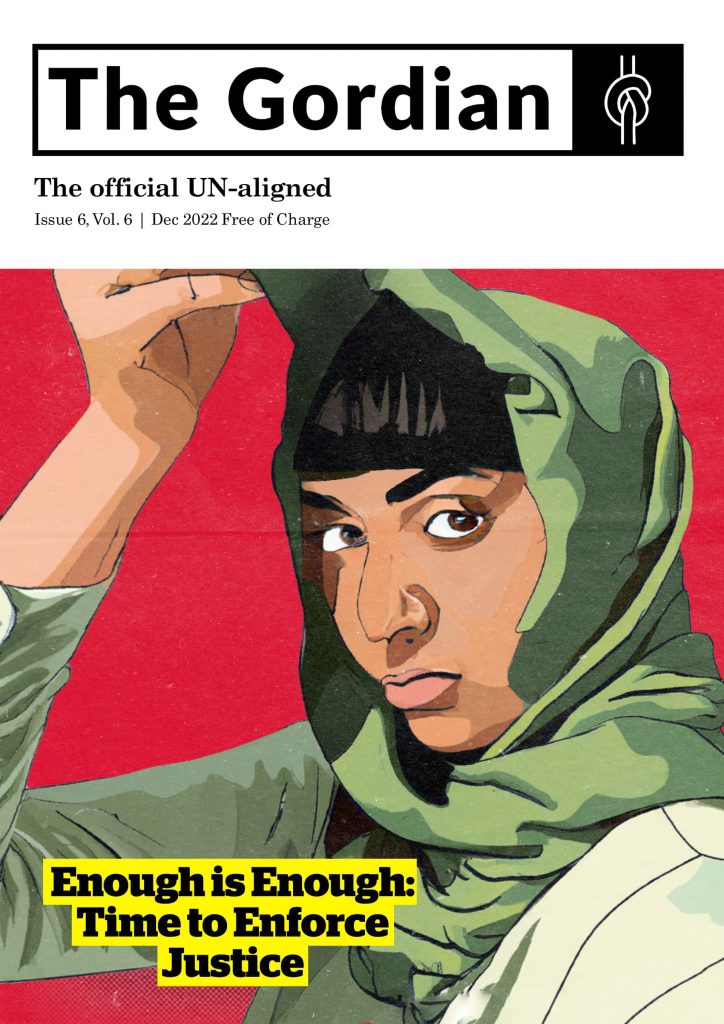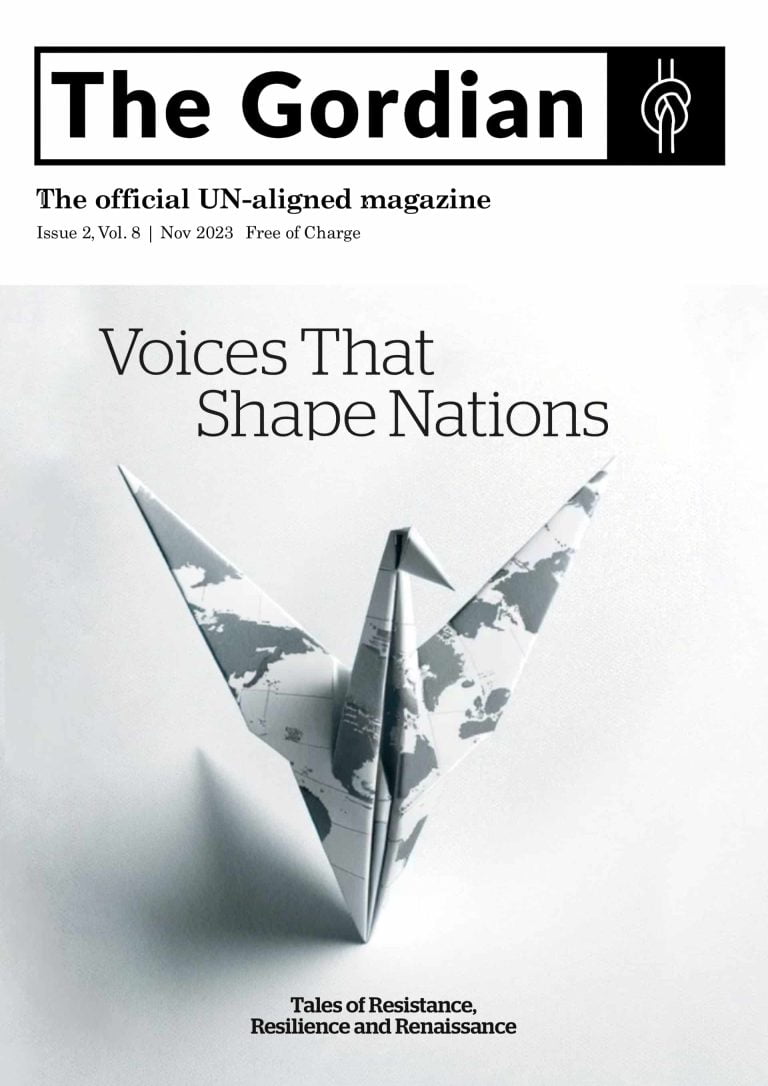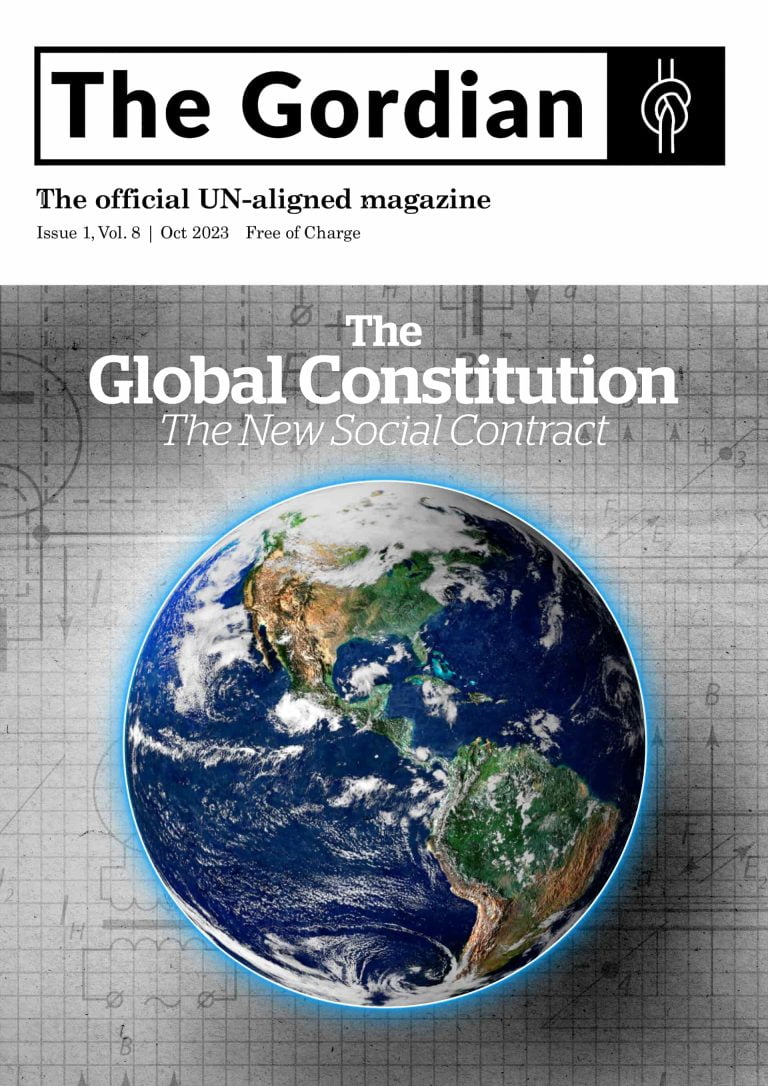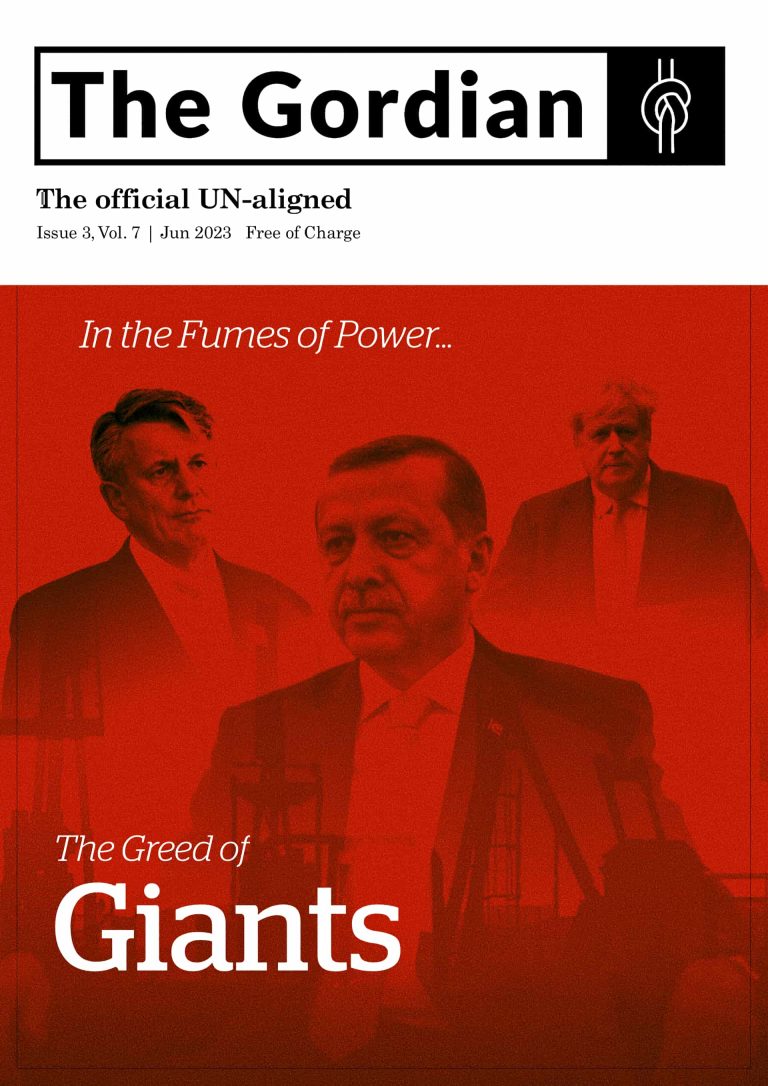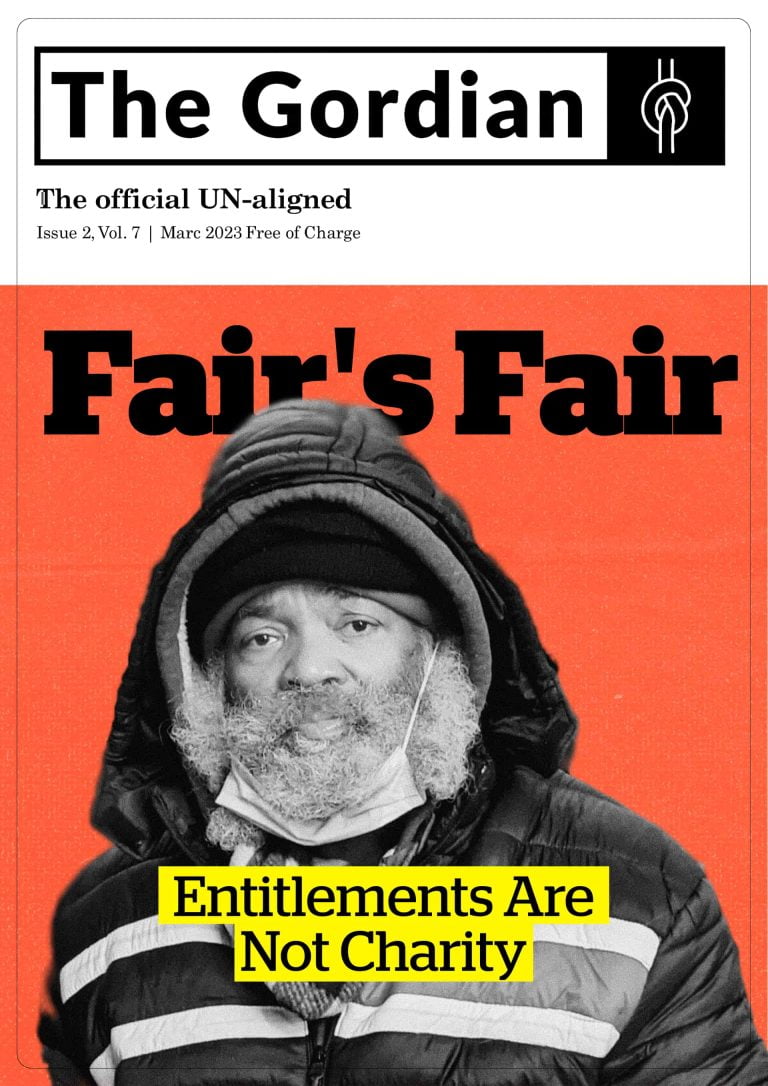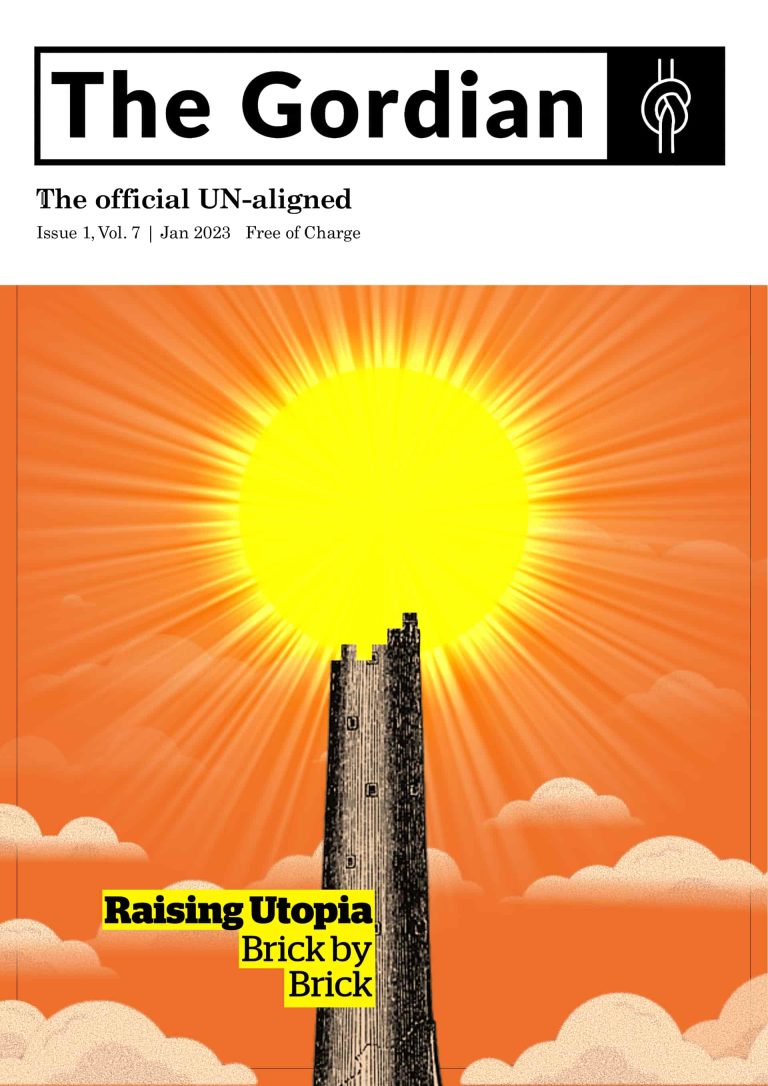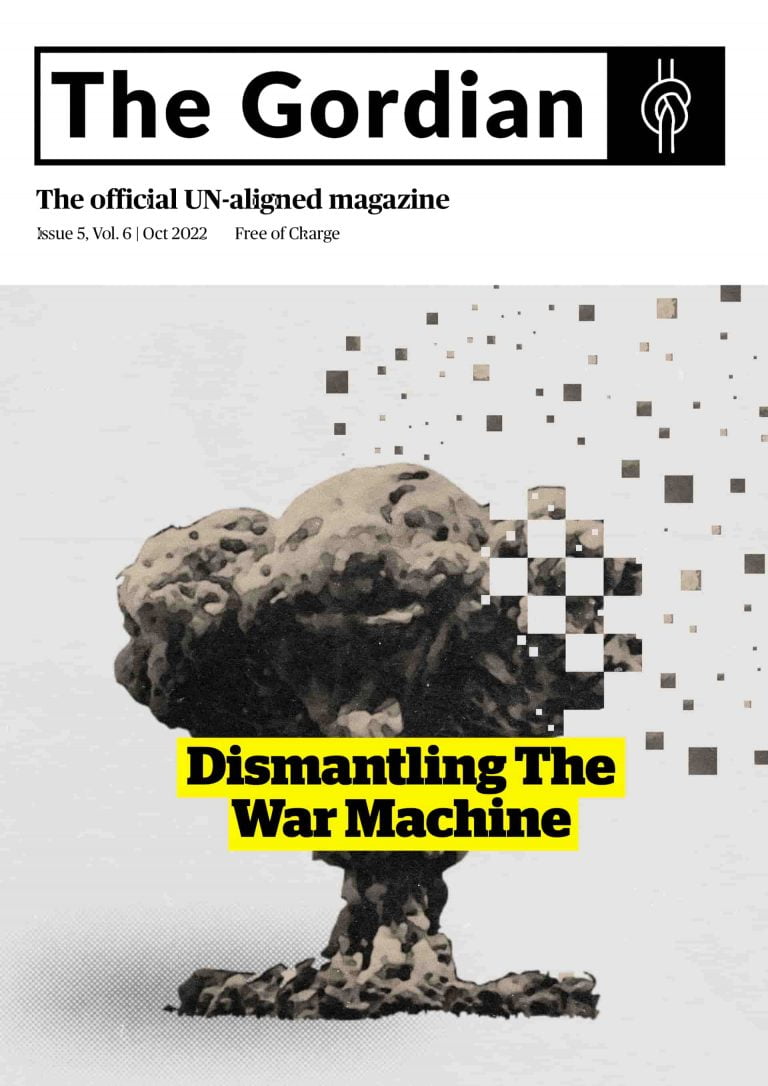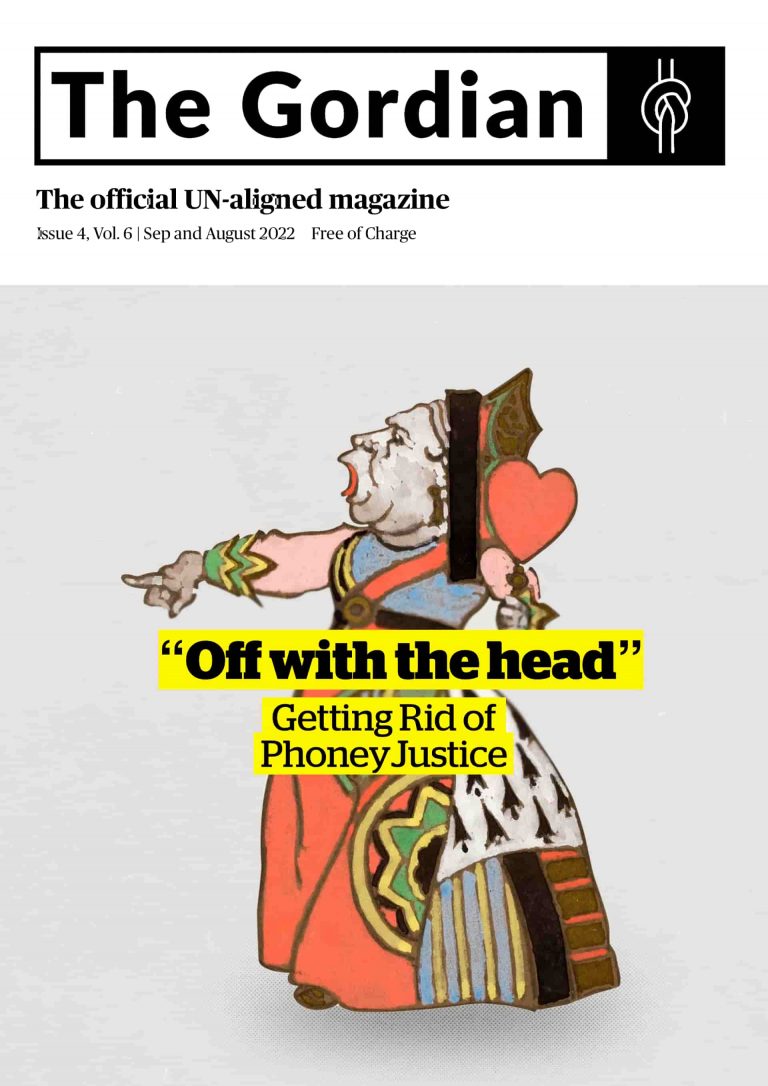Letter From the Editors
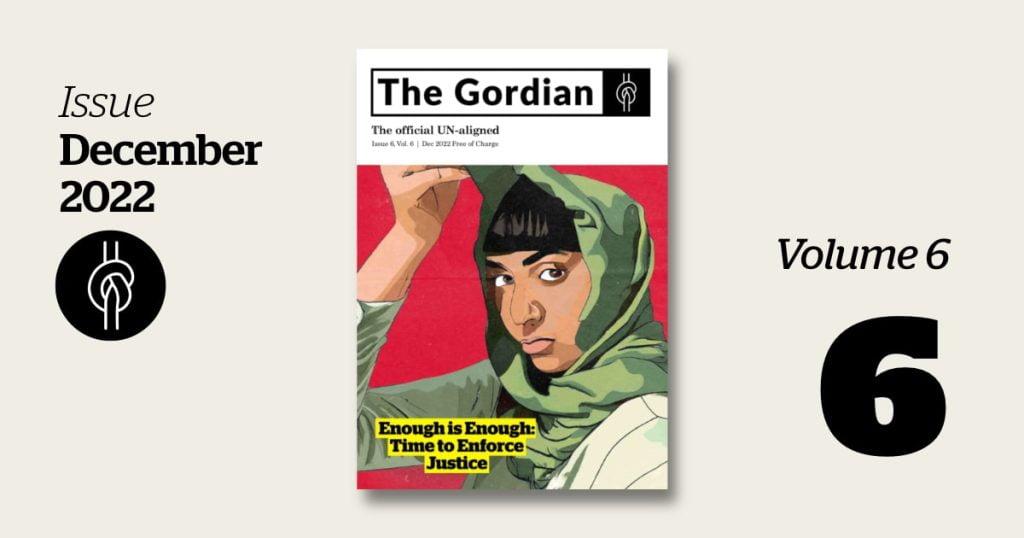
Welcome to the December issue of the Gordian Magazine. In this edition, we have a range of thought-provoking and informative articles for our readers.
The main theme of this volume is still justice. In particular, we discuss how to effectively enforce it.
As usual, the Gordian begins with our monthly recap containing news items you may have missed in November 2022. In a separate article, we also introduce the winners of this year’s Nobel Prize in physics, chemistry, and economics.
Next, we are pleased to announce the winners of the 2022 UN-aligned Environmental Quiz and introduce our latest volume of the magazine, which focuses on the theme of Utopia.
With the 2022 World Cup being held in Qatar, Maya Bearyman writes about how FIFA’s male-dominated World Cup was a feast for ‘straight men’ and how the competition failed to represent its diverse fan base.
In our UN in Focus column, we discuss several topics: Elvira Ineza writes about whether it is time to kick Russia out of the Security Council and how in Haiti, a tragedy is unfolding in front of our eyes.
The fight for justice is also unfolding in front of our eyes. Despite the brutality of the security forces in Iran, protests continue to thrive and grow. The courage and defiance of women is inspiring, and their determination to stand up for their rights is a testament to their strength and resilience.
In the last piece of the UN in Focus column, Ariana Yekrangi discusses how the UN HRC’s new vote on a fact-finding investigation into human rights violations in Iran exposes disturbing facts about the Council and its ability to protect human rights.
In this issue, we also bring to you an exclusive report about a two-hour-long audio leak of a secret meeting between Iran’s Basij commander and news outlets which reveals some of the regime’s tactics to suppress dissent.
This month’s guest author is Tad Daley, who wrote a thought-provoking piece on Dante’s vision of the end of war, and the unity of humankind. He argues how Dante showed us the pathway out of the Ukraine war and the potential for world peace.
This month’s Solutions with Omar includes an article on the United Nations Parliamentary Assembly. Omar discusses potential challenges to the success of the UN Parliamentary Assembly and its proposal for representative democracy.
Our literature section features the poem 86 Million, which is part of our Poems for a better world column. Our literary Editor, Alex Liberto, wraps up the column with a piece on how the age of self-discovery has changed English poetry and the English novel forever.
In the art section we have a fascinating article on the story of Pamfilo of Magliano as told by his great niece, Carla.
Next, in our first ever obituary column, we remember a dedicated contributor to the magazine Ayten Aydın. We sincerely hope to receive more contributions to this column. Please do contact us to send an obituary about your loved ones.
Finally, we have a quiz for our readers to test their environmental knowledge on topics such as climate, energy, and conservation.
Before sending you off to the magazine, we would like to take a moment and apologise for the recent gap in between our publications. As you may know, our magazine is run by volunteers, and unfortunately, the tiniest unforeseen circumstances can result in a Gordian-less month.
We are dedicated to bringing you high-quality content and appreciate your continued support. We are working hard to get back on track and will do our best to ensure that this doesn’t happen again in the future. If you like to support us, consider becoming a Patreon of the magazine. You may also write, research and volunteer with us.
Thank you for your understanding and patience. We hope you enjoy this edition of our magazine.
In One Look: Madness in Israel and coup Attempt in Sao Tome…
By Adrian Liberto
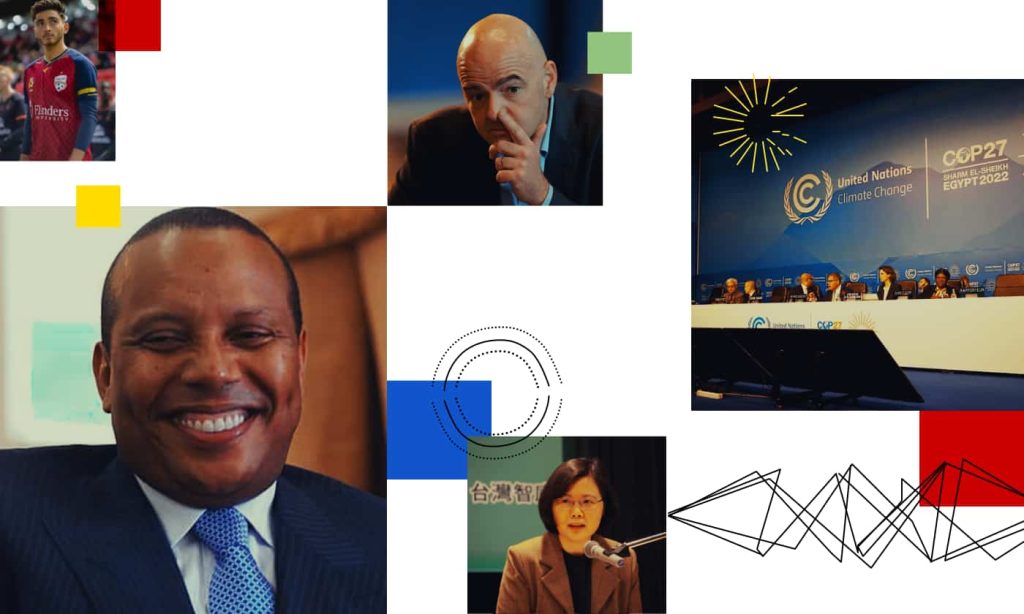
By Adrian Liberto
Stay up-to-date with the latest happenings from the past month with our monthly recap. From major events to key developments, we’ve got you covered.
Who are the 2022 Nobel Prize Winners?
By Elvira Ineza
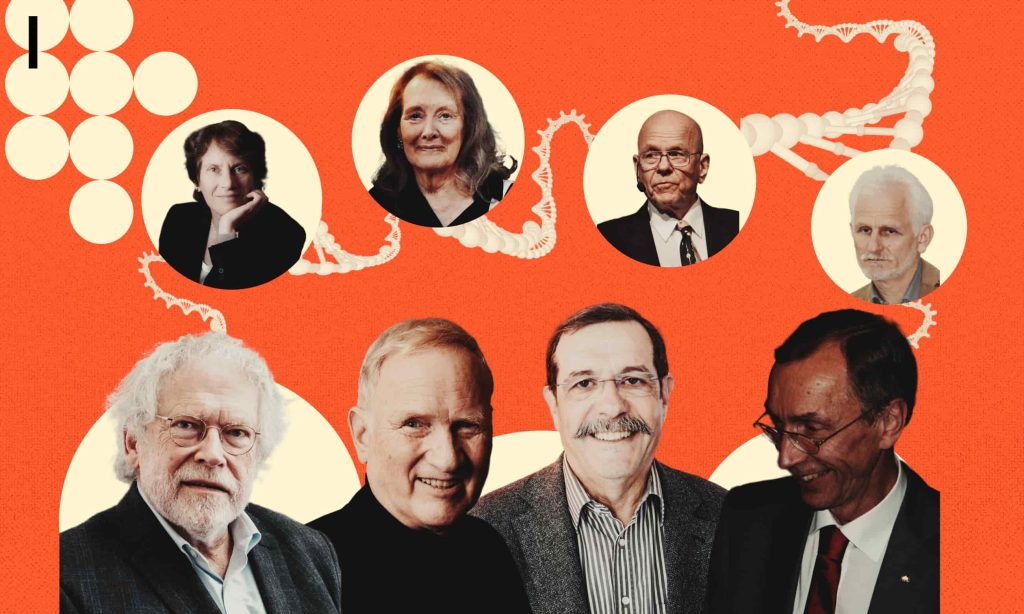
The Nobel Prize is a prestigious international award that recognizes individuals who have made significant contributions to various fields, including physics, chemistry, physiology or medicine, literature, peace, and economics.
Established by Swedish inventor Alfred Nobel in 1895, the award is presented annually to individuals who have demonstrated exceptional achievements in their respective fields. The Nobel Prize is considered one of the highest honours that can be awarded, and recipients are often recognized as leaders in their fields.
The Nobel Prize in Physics
Winners: Alain Aspect, John F. Clauser and Anton Zeilinger “for experiments with entangled photons, establishing the violation of Bell inequalities and pioneering quantum information science”.
In experiments conducted over the last 50 years, they confirmed the reality of an effect that Albert Einstein had disdained as “spooky action at a distance.”
Eva Olsson, a member of the Nobel Committee for Physics, noted that quantum information science had broad implications in areas like cryptography and quantum computing.
The Nobel Prize in Chemistry
Winners: Carolyn R. Bertozzi, Morten Meldal and K. Barry Sharpless “for the development of click chemistry and bioorthogonal chemistry”.
“This year’s Prize in Chemistry deals with not overcomplicating matters, instead working with what is easy and simple. Functional molecules can be built even by taking a straightforward route,” says Johan Åqvist, Chair of the Nobel Committee for Chemistry.
The Nobel prize in Physiology or Medicine
Winner: Svante Pääbo “for his discoveries concerning the genomes of extinct hominins and human evolution”.
Through his pioneering research, Svante Pääbo accomplished something seemingly impossible: sequencing the genome of the Neanderthal, an extinct relative of present-day humans. He also made the sensational discovery of a previously unknown hominin, Denisova. Importantly, Pääbo also found that gene transfer had occurred from these now-extinct hominins to Homo sapiens following the migration out of Africa around 70,000 years ago. This ancient flow of genes to present-day humans has physiological relevance today, for example affecting how our immune system reacts to infections.
The Nobel Prize in Literature
Winner: Annie Ernaux “for the courage and clinical acuity with which she uncovers the roots, estrangements and collective restraints of personal memory”.
In her writing, she consistently and from different angles, examines a life marked by strong disparities regarding gender, language and class. And when she with great courage and clinical acuity reveals the agony of the experience of class, describing shame, humiliation, jealousy or inability to see who you are, she has achieved something admirable and enduring.
Ernaux becomes only the 17th woman to have been awarded the prize, which has been given to 119 writers since it was formed in 1901. Her path to authorship was long and arduous. Among her novels are ‘A Man’s Place, ‘A Woman’s Story and ‘Years’.
Ernaux’s work is uncompromising and written in plain language, scraped clean.
The Nobel Peace Prize
Winner: The 2022 Peace Prize is awarded to human rights advocate Ales Bialiatski from Belarus, the Russian human rights organisation Memorial and the Ukrainian human rights organisation Center for Civil Liberties.
The Peace Prize laureates represent civil society in their home countries. They have for many years promoted the right to criticise power and protect the fundamental rights of citizens. Together they demonstrate the significance of civil society for peace and democracy.
They have made an outstanding effort to document war crimes, human rights abuses and the abuse of power.
The Sveriges Riksbank Prize in Economic Sciences
Was jointly awarded to Ben S. Bernanke, Douglas W. Diamond and Philip H. Dybvig “for research on banks and financial crises”.
An important finding in their research is why avoiding bank collapses is vital.
Winners of the 2022 Environmental Quiz
By Partho Pratim Chatterjee

Five indivduals have been selected as the winners of the 2022 UN-aligned Environmental Quotient Quiz.
The UN-aligned Environmental Quiz has announced its winners, with 5 participants scoring a perfect score. A total of 279 people took part in the quiz, which was available for free on unstop.com.
The winners, who scored perfectly in the competition are: Gaurav Kumar, Nitin Ranjan, Aditya Ratnakar, Rohit Wadhwa and Rishabh Bansal
The UN-aligned Environmental Quiz aimed to raise awareness about important environmental issues and promote sustainability. We congratulate the winners and thank all participants for their engagement and interest in these topics.
We hope that the quiz has provided a valuable learning experience and encouraged participants to take action to protect the environment.
UN-aligned will continue to promote sustainable practices and support efforts to safeguard our planet for future generations.
If you like to support our mission, please consider becoming a free member and contributing to The Gordian Magazine.
The Gordian Magazine introduces new series about ‘Utopia’
By Ariana Yekrangi
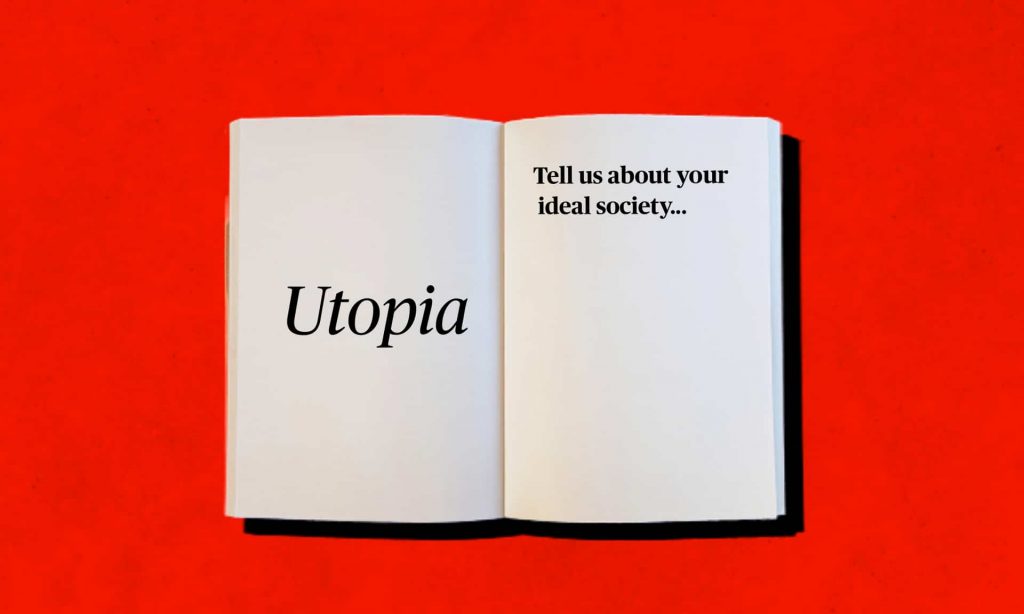
This month’s Gordian Magazine marks the end of volume 6 in which we covered various aspects of justice and its relationship to law enforcement.
10 Key Points to Consider for Effective Law Enforcement and Justice
By Adrian Liberto
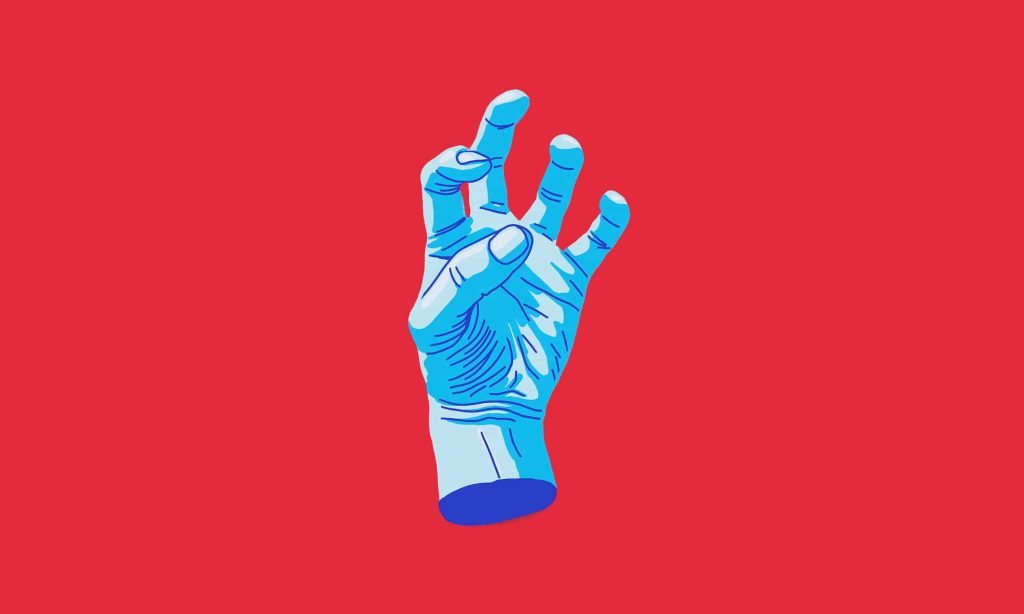
Ethical values should guide the definition of crimes and the creation of an international peace and police forces is key to effective law enforcement.
In the last few issues of The Gordian, we have covered various aspects of justice, from the definition of justice itself to specific instances regarding the assaults it is often subject to. In order to understand justice from a legal perspective, however, it is important to bear in mind the various aspects that are involved in law enforcement. Here are some important points to bear in mind:
1. Ensuring ethical, global, flexible and measured definitions of criminal acts
Law is relative; very relative. Many things that are legal are still morally wrong, such as the exploitation and abuse of animals, while things that are illegal may not be wrong at all, nudism or lèse-majesté , for instance. Moreover, certain acts may be wrong, but not necessarily wrong enough to be defined as a crime: raising one’s voice in a restaurant, poor hygiene, wearing socks with sandals… Finally, as Partho’s article in this issue highlights, as humanity and technology evolve, so will our norms. Defining a crime therefore is no easy matter and this can only be safeguarded by well-defined ethical values, such as respecting the dignity of every being, whether human or not.
2. Having the mechanisms in place to prevent or minimise crime
Safety is a human right, but it is not simply just a matter of policing. Imagine a world where everyone is attached to a little gadget that would make breaking the law nigh on impossible. Would that make us honourable? No, of course not; it would programme and degrade us, even if technically it would not make much difference to those who are not inclined to break the law in the first place. In a sense, all deterrents have the same effect, though in a less deterministic or behaviouristic way.
There is already enough programming going on in this world. Indeed, we should endeavour to have better fences, but what we should strive harder for is inspiring our neighbours to be better citizens, as discussed in point 10.
3. Establishing policies and procedures to detect the crime and the criminal
If an action is considered serious enough to constitute a crime, then the resources should be there to deal with it without interference. Too often the law is loaded in favour of the rich and powerful. As the old ditty goes:
They hang the man and flog the woman
That steal the goose from off the common,
But let the greater villain loose
That steals the common from the goose.
4. Ensuring penalties are commensurate with the crime and that they are preventative and rehabilitative rather than vindictive
Prisons should be a last resort and wherever possible, community service should be the preferred option, coupled with rehabilitation. For lesser crimes, fines should be proportional to the assets of the law-breaker. Also, fines should be used in conjunction with other penalties when the crime is substantial.
Large corporations, for instance, are often happy to pay hefty fines for polluting rivers or causing environmental disasters, because the rewards can be even greater.
5. Developing the necessary resources to carry out rehabilitative and follow-on programmes
Whatever penalties and programmes are decided on, the funding has to be there to ensure that they are provided adequately.
6. Having a well-trained and accountable police force with the authority and physical means to bring the criminal to justice
Laws with penalties that cannot be enforced are not worth the paper they are written on. This is particularly true of international law, where murderous bullies like Putin are allowed to go scott free whilst committing the most heinous crimes (refer to point 8).
7. Compensating victims of crime and offering support services such as counselling, where appropriate
Even a minor crime can have a devastating effect on the victim, so mechanisms must be in place to support every person who has suffered an injustice.
8. Instituting an international police force that is always better resourced than national ones
As long as a nation state is more heavily armed than an international peace or police force, that state will remain impervious to restraint. This makes a mockery of international law.
9. Ensuring the international police force is supervised by a multinational ethical body and that it is structured to withstand abuse
“The best laid schemes o’ mice an’ men / Gang aft a-gley.”
It is therefore imperative to institute safeguards to circumvent any attempts to undermine, exploit or hijack the system.
10. Investing in education and social development in order to gender societies that have little or nothing to gain by breaking the law
As long as humanity indulges in its selfish and hypocritical ways, crime will continue to thrive. The best deterrent is respect. We need to learn how to respect each other, the planet and all those who live on it. Only then will the lifeblood of crime start to dwindle.
Implementing each of the above points will necessarily require some fundamental changes that will require much thought and debate. They are not the solutions, but the signposts towards the solutions we should be striving for.
Qatar 2022: A World Cup for Straight Men
By Maya Bearyman
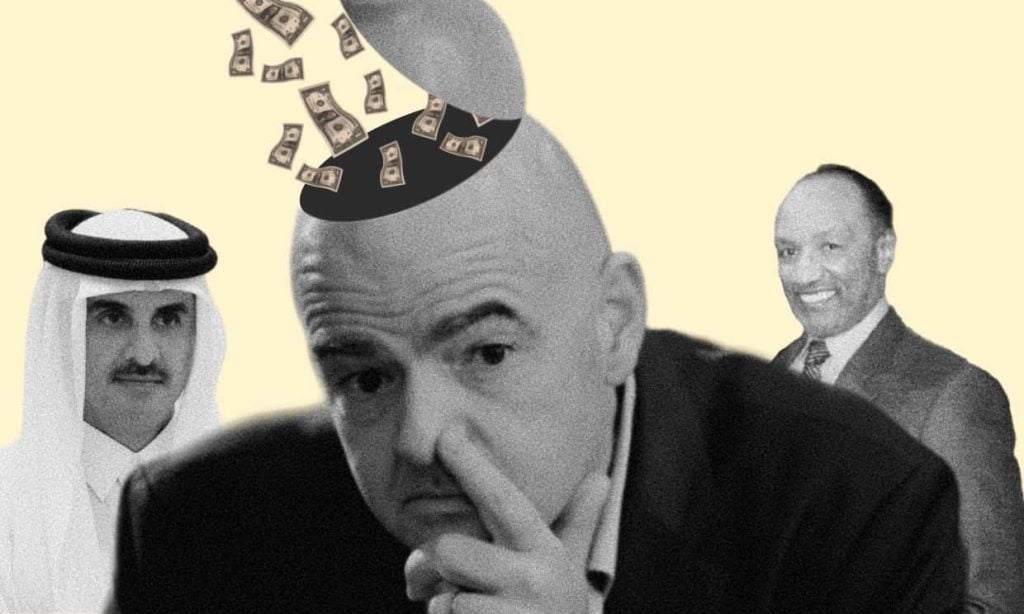
FIFA’s male-dominated World Cup fails to represent its diverse fan base, but those fighting for equality will persevere.
Not too long ago, I wrote an article for The Gordian Magazine celebrating the growth of women’s football in the UK, and hailing 2022 as a watershed year in women’s sport around the world. Now, just a few months later, nothing seems further from the truth. In choosing to host one of the world’s biggest sporting competitions in Qatar this year, a country run on Sharia law and plagued by inequalities, FIFA has let the world know that football remains the domain of straight men.
“The wrong kind of man”
Members of the LGBT community in Qatar could face more than a decade in prison and homosexual acts could technically be punished by death. Human Rights Watch found that, as recently as September, LGBT people have been arrested by Qatari forces and subjected to ‘ill-treatment in detention’. A danger index compiled in 2019 to guide LGBT travellers rated Qatar as the second most dangerous place to travel for queer people.
Despite these obvious human rights abuses, FIFA chose, not only to award the men’s World Cup to Qatar in the first instance, but also to support Qatar’s homophobia by banning all captains from wearing rainbow armbands in support of LGBT people and the ‘One Love’ movement.
I love sex with other men… get used to it or get out of football.
Lifelong fans of football, both allies and members of the LGBT community themselves, have rallied against this decision. German football fan and activist Dario Minden made an impassioned speech to Qatar’s ambassador to Germany, Abdullah bin Mohammed telling him ‘I love men. I do… please don’t be shocked… have sex with other men. That’s normal. So please get used to it or get out of football.’
The shocking reality is that there are no gay football players at the 2022 Men’s World Cup. There is only one openly gay man in top-flight football, Australia’s Josh Cavallo, who says he would be ‘scared’ to play in Qatar and feels excluded from this World Cup.

He says: “At the end of the day the World Cup is in Qatar and one of the greatest achievements as a professional footballer is to play for your country; and to know that this is in a country that doesn’t support gay people and puts us at risk of our own life, that does scare me”. Several closeted top-flight footballers have reached out to Cavallo, afraid to come out and live their authentic lives.
In 2009, Brazilian player Richarlyson Barbosa Felisbino was accused of being gay by a rival team. The charges were thrown out by a judge who claimed, ‘football was a virile masculine sport and not a homosexual one.’ Recently, he came out as bisexual.
In January 2019, top-flight Brazilian player Douglas Braga claimed he quit football at just 21 because he claimed it was not possible for him to be both gay and a footballer. Douglas Braga had a promising future, it’s possible that he could have played for Brazil in this World Cup. It’s a very uncomfortable truth that FIFA has shown that Braga was probably right; being an out gay man having sex with a male partner at this World Cup, would have risked his safety.
Now, Braga does vital work coaching a team in the Brazilian league for gay men. LiGay is just one example of a footballing community of LGBT members who will continue to fight for equality in the sport despite FIFA’s decisions.
40% of the online abuse levelled at male football players globally in 2021, was homophobic. If we have any chance of changing this staggering statistic, grassroots movements like LiGay are vital and deserve the support of the world’s footballing association.
Women too boycotted this world cup
Likewise, in its decision to award the World Cup to Qatar, FIFA has made the statement that women spectators of the support are not important. Despite both Qatar and FIFA being very clear in saying that female supporters are welcome in their stadiums, many women have taken the decision not to go.
Founder of the female football fan platform This Fan Girl turned down free tickets and expenses to attend the tournament claiming, ‘It was a no-brainer…I am happy to sit this one out.’ Indeed, many people have taken to social media to say that they noticed a significant lack of women.
So strange to see no women in the Qatar crowd, no families just all men…#WorldCup
— jolene hammonds (@Joeytweeting) November 20, 2022
There are good reasons for women to boycott this world cup. Whilst female spectators are allowed into the stadium, if this World Cup was being held in another country, Qatari women would have to ask their male guardians to travel to attend. Within the guardianship system, women must ask permission of their male guardian, typically a husband, father, brother or even son, to study, drive and travel. Women must provide proof of marriage to receive sexual health or antenatal care, and prosecutions for sexual or domestic violence are virtually zero. These risks are faced by visitors to the country in equal measure.
In 2020, 13 Australian women were forcibly removed from Qatar Airways and forced to undergo unnecessary, invasive internal examinations.
In June 2021, female Mexican World Cup official Paola Schietekat reported being violently sexually assaulted in Doha and was met with a three-hour interrogation and calls for a virginity test. Her attacker accused her of being in a romantic relationship with him and she became ‘the accused’. As the case progressed, it was clear that the focus was on a supposed extra-marital affair, and Paola was threatened with up to seven years in prison, and 100 lashes.
FIFA claims that this World Cup is safe for women. Despite this, it encourages female spectators to ‘dress properly’ and those who don’t could face jail. Niyas Abdulrahiman, the Chief Technology Officer for the FIFA World Cup in Qatar, warned that ‘We have high-resolution special cameras to zoom in on a particular seat and clearly see the spectator. It’s being recorded, so that will help us in any post-event investigation.’
It is evident that, like members of the LGBT community, women travelling to Qatar for this World Cup are putting themselves at risk. FIFA have given anyone other than straight men a sobering choice: risk their own personal safety or be excluded from this World Cup.
Why was Qatar chosen to host the 2022 World Cup?
Like with most global problems, the explanation is to follow the money. In 2011, the Sunday Times broke the story that Bin Hamman, Qatari football official and President of the Asia Football, had paid $5 million in bribes to get support for his bid.
The host for the World Cup is chosen by a ballot system where the FIFA Congress votes. Each of the 211 member states of the FIFA Congress is allotted one vote, and bids are accepted after it is determined that the potential host country is willing to build the necessary infrastructure.
Bin Hamman allegedly paid up to $200,000 into the accounts of 30 African football associations to induce their representatives in the FIFA Congress to vote for Qatar. Hamman also allegedly paid $1.6 million into the account of Jack Warner, the then Vice President of FIFA. $450,000 of this was before the World Cup vote. Warner was one of 22 people who allowed the Qatari bid to succeed.
In addition, FIFA benefited from a $400m TV rights deal with Al Jazeera, offered just 21 days before the vote and they promised an extra $100 million if the bid was successful.
Finally, French FIFA Congress representative Platini switched his vote to Qatar after meeting with the Emir of Qatar. Qatar later bought out Paris Saint-Germain, increased its stake in a French Media group and bought up many of the rights to French football.
It is evident that many individuals and state associations have benefited from Qatari money, and later decided to support Qatar’s bid, despite its short football history and documented human rights abuses. Allegations of corruption in FIFA are widespread and is often an explanation proposed to answer the question of why FIFA invited all of the controversies in allowing Qatar to host the World Cup 2022.
Some wealthy straight men would like to think that they own football.
Globally, women’s football associations, grassroots projects and gay football teams are working hard to show them that isn’t true. FIFA have thrown this work back in their faces; by prioritising finances over the true spirit of football, they have shown that global football is not inclusive. They risk the safety of their gay and female fans and have prevented many, including allies, from supporting the tournament.
This article didn’t even touch on Qatar’s horrendous treatment of the foreign workers who built the infrastructure necessary to host the 2022 World Cup, where estimations for the death toll reach the tens of thousands.
Despite FIFA’s protestations, this is the world cup of straight, wealthy men; football has failed to include a considerable proportion of its fans, and it will suffer for it. Despite this, those fighting for equality will persevere.
Alex Scott you legend pic.twitter.com/Tvzei6sh5s
— Ali Tweedale (@alitweedale) November 21, 2022
Alex Scott, ex-England Women’s player in the photo above, chose to wear the rainbow ‘One Love’ armband, in support of LGBT people whilst commentating, despite the considerable personal risk to her safety.
If you agree that this world cup is morally corrupt, please support the Women’s World Cup in Australia & New Zealand in 2023, which will continue to fight for equality in football, showing that every fan and player matters.
UN in Focus
Will Russia be kicked off the Security Council?
By Elvira Ineza
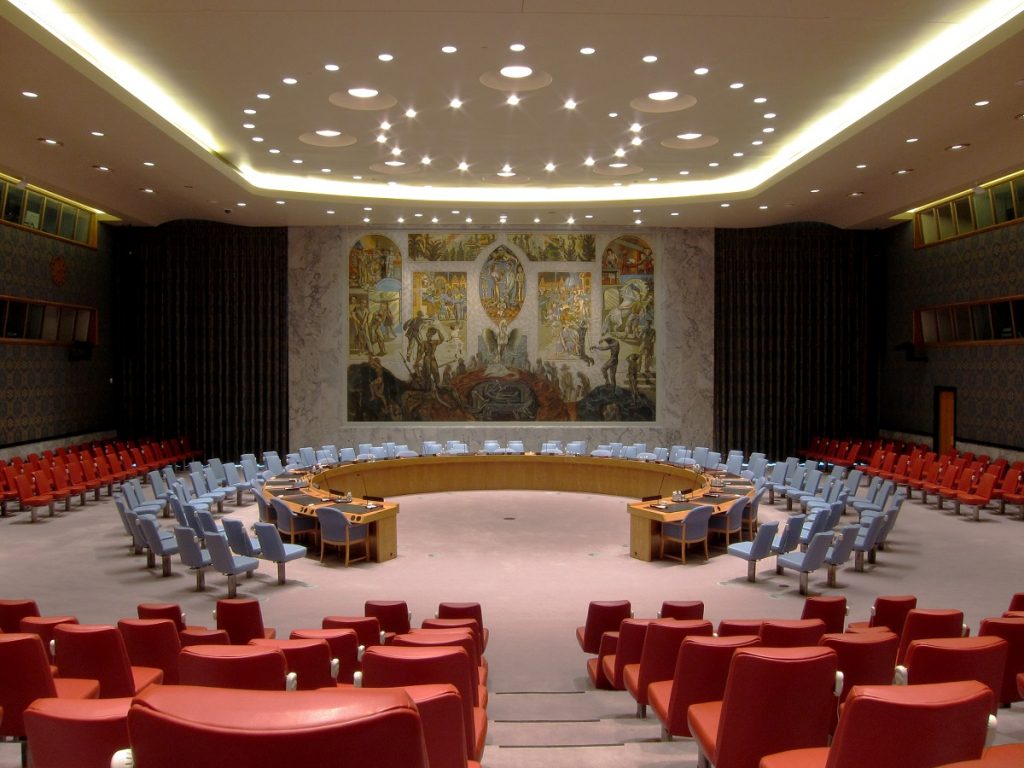
Following the General Assembly declaring the annexation of Ukrainian illegal, Russia’s presence on the UN Security Council has officially lost its legal basis.
According to its charter, the UN was created to maintain international peace and security, protect human rights, deliver humanitarian aid, and support sustainable development. Each of these is an honourable goal that is sometimes brought to fruition in parts of the world.
193 countries around the globe are members of the United Nations and among those are the P5 (permanent Security Council Members) chosen because of their importance in the aftermath of WWII. Each one of these countries is part of the UN because they claim to believe in what this organisation stands for.
When we take time to look at what is happening in the world, we are once again reminded that maintaining international peace and security is a never-ending aspiration.
Although according to the UN charter there is no mechanism to remove a permanent member from the security council, the repeated violations of the Russian Federation are proof that its presence on the UN Security Council has already lost its legal basis.
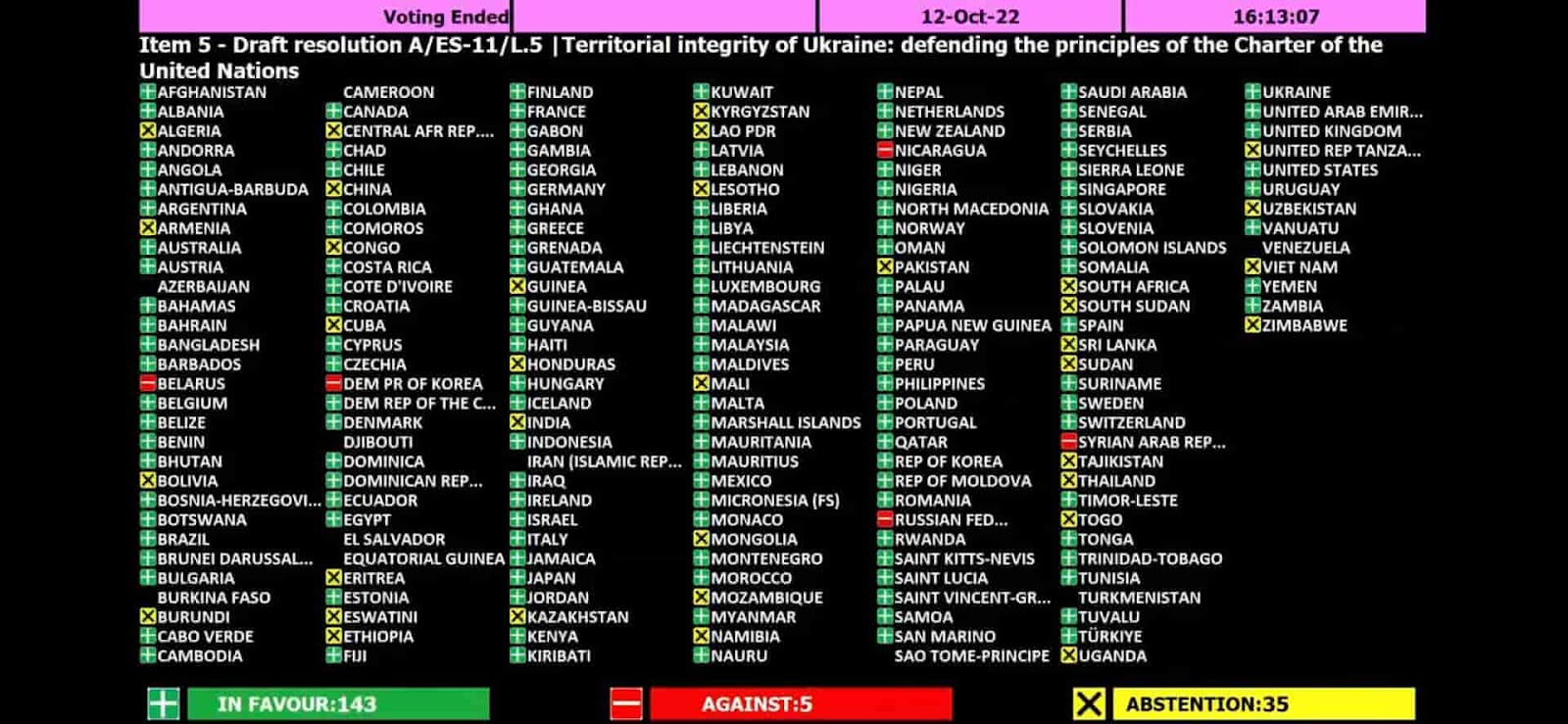
On October 12, 2022, during the United Nations General Assembly, 143 states voted in favour of calling Russia’s proclaimed annexation of four Ukrainian regions illegal. Only four other countries sided with Russia by voting against it, while 35, including China, India and South Africa abstained. Having vetoed a similar resolution in September, Russia called this one heavily politicised.
The General Assembly vote comes after the body’s resolution in April, calling for Russia to be suspended from the Human Rights Council.
After the adoption of the resolution, Russia’s Deputy Permanent Representative Kuzmin announced that Russia had decided to leave the Council before the end of its term.
One may ask what reasons may have caused some countries to abstain from taking a stand in the face of such human rights violations; or Belarus, Syria, Nicaragua and North Korea to vote for such a clear violation of the UN charter?
Clearly, their perceived national interests are more important to them than any of the noble founding principles of the organisation.
The question remains as to why the process of removing Russia from the UN Security Council is such an arduous chore for an organisation whose pledge is to protect human rights and maintain international peace and security.
UN Security Council: Differences over Haiti
By Elvira Ineza
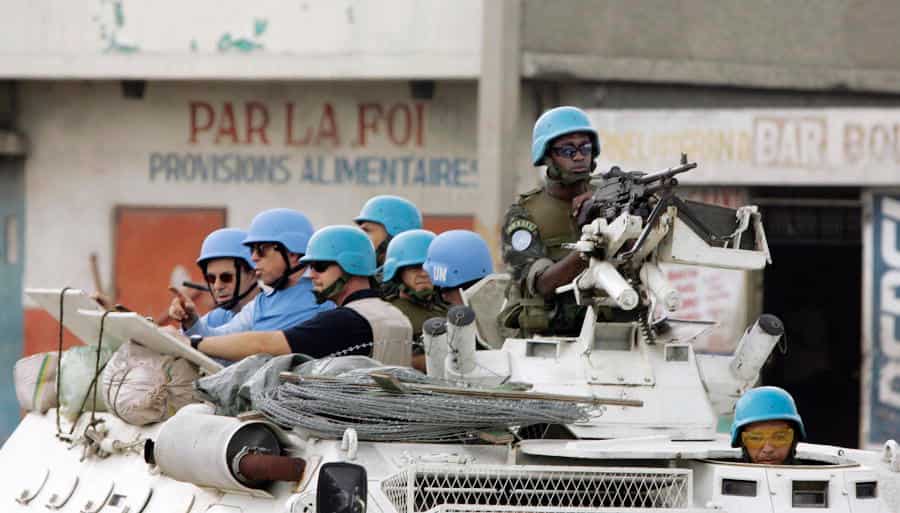
The UN Security Council finally establishes sanctions regime on Haiti to punish actors threatening peace and security.
Many international organisations have warned about the worsening situation in Haiti, but some members of the United Nations were set on keeping the aid package to Haiti strictly humanitarian stating that they would let the Haitians solve their own political issues.
However, in the face of the growing threat to peace and security due to gang-related violence, hunger and an infrastructure crisis caused by several natural disasters, as well as the lack of proper medical equipment and personnel in response to the needs of the Haitian population amid several health emergencies such as the cholera outbreak, on October 21, 2022, the UN Security Council unanimously voted to establish a sanctions regime on Haiti to punish the actors responsible or complicit in actions that threaten peace, security, and financial stability in the region.
These sanctions come long after many have called for the UN to come to Haiti’s aid, but the organisation decided to strictly provide humanitarian aid and refrain from taking steps to address the political issues in the region. Had these sanctions come earlier, that would have undoubtedly saved many lives or at least kept the situation from worsening as it has.
UNICEF and WHO: Alarm over cholera outbreaks
By Elvira Ineza
As Cholera outbreak spreads across 29 countries, UNICEF calls for 27.5 million to combat disease.
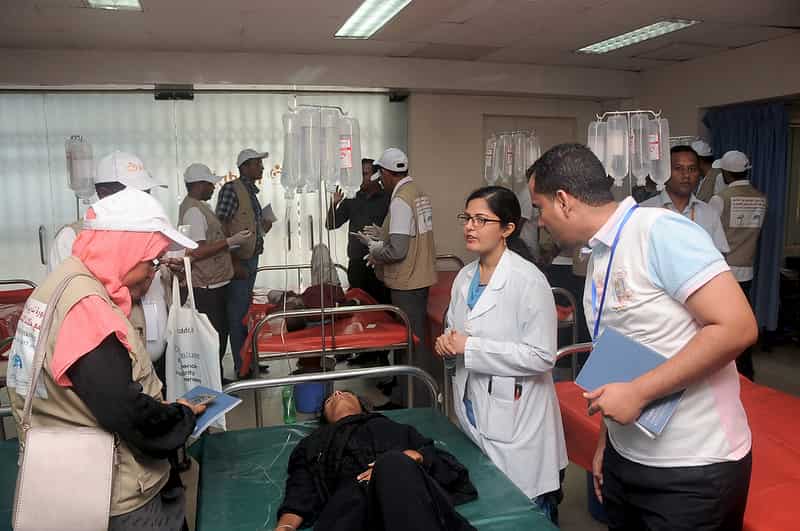
A human tragedy
Victims of the cholera outbreak have now been reported in more than 29 countries including Kenya, Somalia, RDC, Haiti, Syria, and Lebanon.
On top of numerous issues plaguing Syrians, the outbreak of cholera and the start of winter all chip away at the already thinning resources in the region. It is reported that more than 14.6 million people there need assistance.
UNICEF has appealed for $27.5 million to help combat the spread of cholera in Haiti, where roughly 40% of confirmed cases are children.
Many steps have been taken to stop the spread of cholera, but more still needs to be done to treat those affected and prevent further infection in the parts of the world yet affected.
What is Cholera?
Cholera is an infectious disease that causes severe diarrhoea and dehydration. It is caused by the bacterium Vibrio cholera and is typically spread through contaminated water.
Cholera can be fatal if left untreated, but it is preventable through proper hygiene and sanitation measures.
To prevent cholera, experts advise the consumption of clean water, regular and thorough hand washing and avoidance of raw or undercooked food.
Vaccines are also available to protect against cholera.
UN makes itself useful and votes on a fact-finding mission into Iran, but don’t look at it too closely
By Ariana Yekrangi
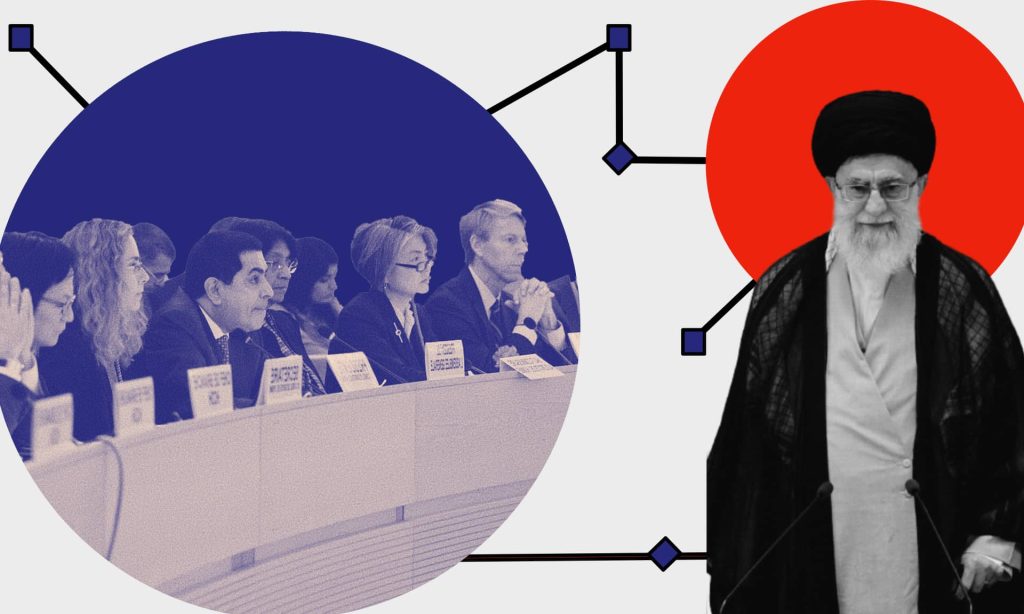
The UN HRC approved a fact-finding investigation into human rights violations in Iran. However, the vote reveals three disturbing facts about the Council and its ability to protect human rights.
When the United Nations is not busy declaring French baguette a world cultural heritage or hosting awkward diplomatic cocktail parties where everyone pretends to like each other’s national dishes, it dedicates a small portion of its resources to protecting human rights across the world.
Earlier in November, a fact-finding investigation into human rights violations in Iran, where hundreds have died and tens of thousands have been detained since protests started in September 2022, has been approved by the UN Human Rights Council.
Investigating Tehran’s notorious record on human rights since the regime’s bloody revolution in 1979, shouldn’t be a big surprise, one would imagine, but sadly, coming from the United Nations, it is.
The special rapporteur is tasked to investigate human rights violations in Iran and report back to the UN, providing a detailed and comprehensive picture of the situation on the ground.
Seeing that sanctions imposed on the regime have had little impact so far, many are hoping that the move could lead to increased pressure on the Iranian government to improve its human rights record. Is this the UN Human Rights Council’s time to shine?
Unlikely. Here are three facts about the vote that show why, in its current state, human rights cannot and should not be left in the hands of the UN Human Rights Council and its members.
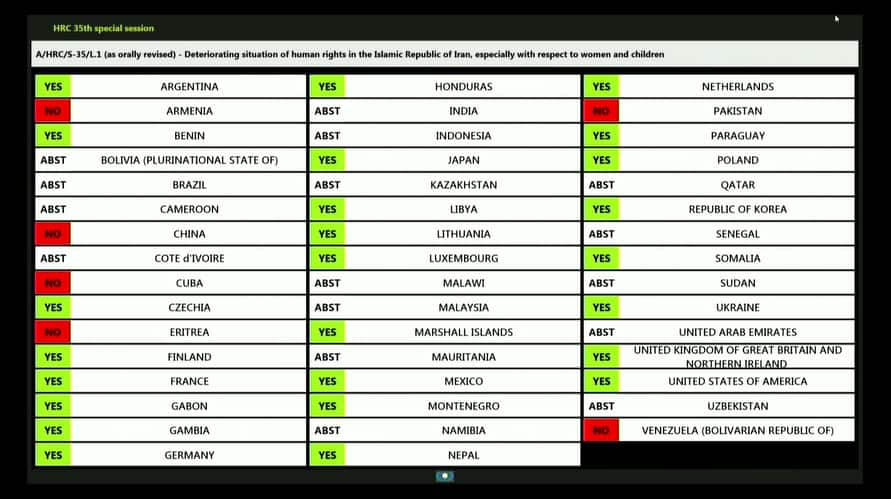
Just over half of the Council actually voted to adopt the resolution
Let’s do some maths: following the vote on the 35th special session on the 27th of November, only 25 out of 47 members voted in favour of the motion. This is about 53% of the members, who agreed to set up a simple ‘fact-finding mission’.
Remember, this is a body of the UN that is entrusted to protect human rights, and almost half of its members are not even willing to investigate serious allegations of human rights abuses, including rape, torture, and discrimination against Iranian women, LGBTQ individuals, and religious minorities.
The United Nations General Assembly, that’s the one with 193 members, elects 47 countries through a majority vote to serve at the Human Rights Council. Candidates are, as one would hope, assessed based on their contribution to the promotion and protection of human rights.
However, here’s the catch: HRC memberships are distributed geographically. So African countries get 13 seats, Asia-Pacific gets 13; Latin America and Caribbean states get 8 seats; Western European and other states get 7 and; Eastern Europe gets 6 seats. Naturally, at some point, Iran itself could run for membership in the Council.
The HRC’s effectiveness is almost always limited by the lack of cooperation from governments that violate human rights. And the reason for the council’s systemic perversity is this: Somewhere along the way the UN prioritised quantity over quality and platforming bigotry over safeguarding human rights. As long as counties that do not give a toss about human rights get to occupy a seat at the HRC, the council will not be able to effectively address human rights abuses.
34% of Council members refused to do their job
Abstaining from voting during crucial decisions at the UN Human Rights Council should not be an option because it diminishes the council’s ability to effectively promote and safeguard human rights.
In diplomatic circles, however, abstaining from voting is like wearing a fake moustache: a comically bad attempt to disguise true identities and avoid upsetting their bullying and unholy friends. In the pursuit of self-interest, however, this flirtation with abstentions can only be done with a serious cost, as abstaining from a vote does not present a neutral stance, but rather a dereliction of duty.
Abstaining from voting, at best, signals a lack of dedication to the council’s mandate of protecting human rights and at worst, it betrays a supportive attitude towards elements who attempt to avoid accountability.
Ideally, the UN Human Rights Council should be the conscience of our civilised world, not a playground for bullying nation-states and for this reason member states must always play an active role in voting during important decisions at the UN Human Rights Council to support the council’s work and ensure that it can successfully carry out its mandate.
Perhaps, instead of spending 20 million euros of UN aid money on, admittedly a beautiful painting for, the ceiling of the council, architects should have opted for printing Edmund Burke’s powerful words on the front door of the chamber: “The only thing necessary for evil to triumph is for good men to do nothing”, reminding all those who enter the chamber that we must stand up for what is right, and never be complacent or complicit in the face of injustice.
Fact-finding missions may find the truth, but what happens then?
Although UN Human Rights fact-finding missions are a crucial tool for the HRC in its mandate to promote and protect human rights around the world, these missions often encounter challenges that limit their effectiveness.
One reason for this is that these missions are often denied access to the countries where the abuses actually occur. Without access to these countries, the fact-finding missions are unable to gather accurate and comprehensive information.
For example, In 2015, a UN HRC fact-finding mission was denied access to Syria to investigate allegations of human rights abuses and war crimes committed by the Syrian government and its allies. The mission was only able to conduct a limited investigation from neighbouring countries, and its final report was rightly criticised for being incomplete. Iran has already announced that it will not collaborate with investigators.
However, assuming the commissions and investigations successfully document what is already common knowledge about the Iranian government’s unlawful force to suppress protests, there is no implementation mechanism for the report.
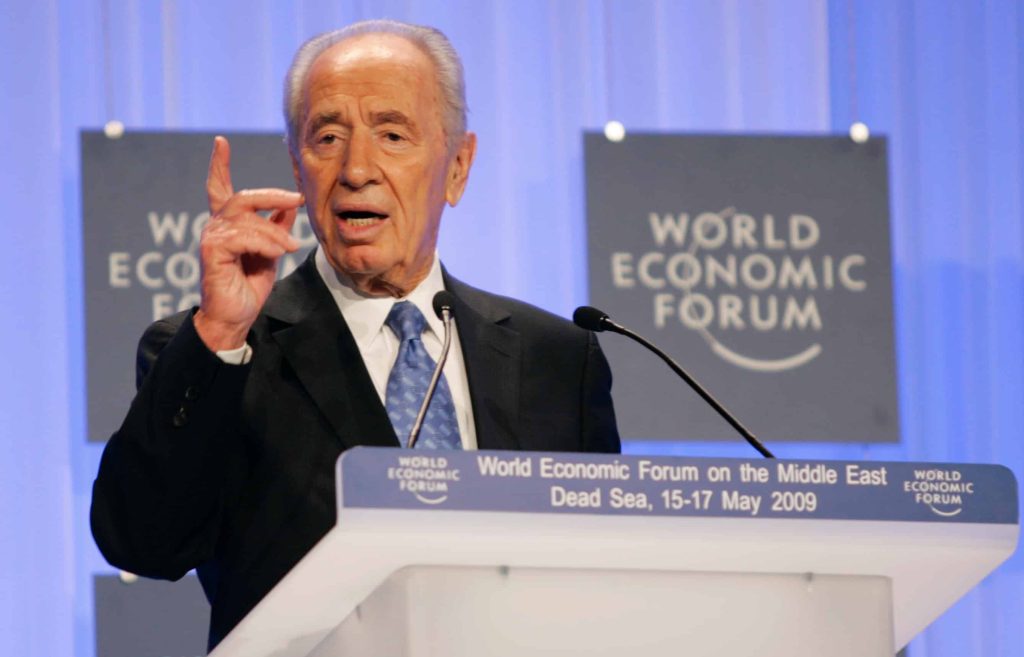
In 2009, the Goldstone Report, which was the HRC’s fact-finding mission to investigate alleged human rights abuses by Israel during its military operations in Gaza in December 2008, found that Israel had targeted civilians and civilian infrastructure, and had used disproportionate force in its operations. The UN General Assembly subsequently endorsed the report and called for its implementation.
What happened? Nothing really. The Israeli government issued an initial 32-point formal response to the fact-finding mission’s report on 24 September 2009. The response listed a series of what it argued were serious flaws and biases in the report, finally concluding that the report perverts international law to serve a political agenda.
The mission’s final report was never implemented and had little impact on the situation on the ground.
Many argue that the findings of the HRC fact-finding missions can potentially be used as evidence by the International Criminal Court (ICC) in its investigations and prosecutions. That might be some good news at least. Though, is it?
While HRC fact-finding missions cannot be sent directly to the ICC, it is true that their findings can potentially be used by the ICC in its investigations and prosecutions of individuals for genocide, crimes against humanity, and war crimes. However, taking a closer look at the ICC cases leaves one with little hope.
In 2021, the ICC had 14 ongoing investigations with each case costing over €10.5 million. Six of those cases dated back over a decade. With so few success stories to speak about, it is highly unlikely that the ICC constitutes much of a deterrent for the Iranian regime.
Depressing aye? Is there anything to celebrate at all?
Yes, there are many reasons to be optimistic.
The move should mark a shift in the international community’s approach towards tackling the crisis of systematic impunity. Perhaps it could also serve as a wake-up call for Iranian authorities to end their all-out militarised attack on demonstrators, and safeguard human rights.
Recently, Iranian women have been receiving recognition from the international community, including being named heroes of 2022 by Time magazine. This vote, along with the growing support from the global community, has given Iranians renewed strength and hope.
The role of an organisation par excellence like the Human Rights Council should provide more than just a hope for those suffering from human rights violations. The HRC is a United Nations body with the mandate to promote and protect human rights around the world. As such, it has a crucial role to play in addressing human rights issues and holding governments accountable for their actions.
Join the UN-aligned’s call for the creation of a better United Nations that represents the best in humanity.
Revealed: Leaked file uncovers how the Iranian Revolutionary Guards plan to quell protests
By Ariana Yekrangi
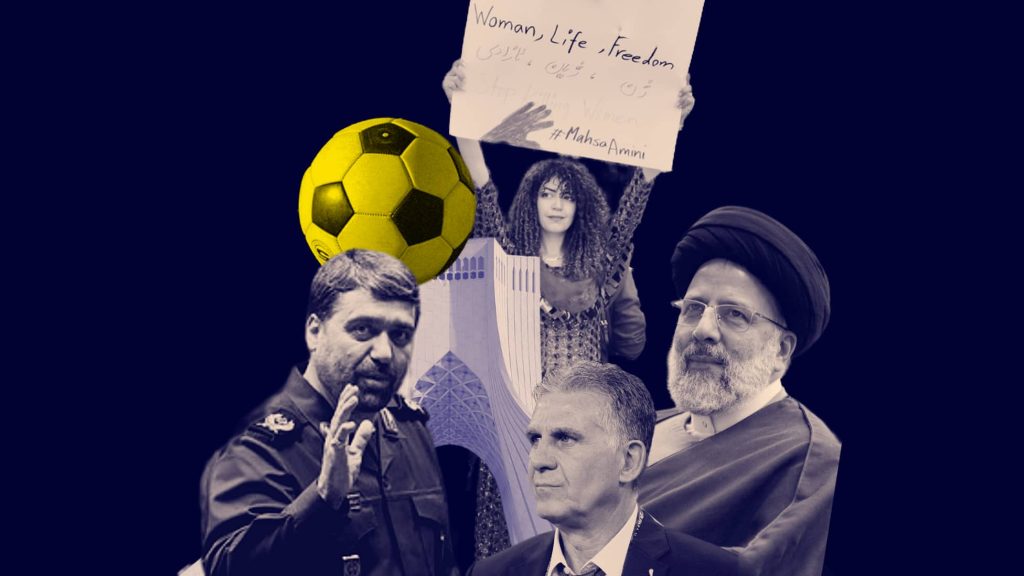
Exclusive: A two-hour-long audio leak of a secret meeting between a Basij commander and news outlets reveals the regime’s tactics to suppress dissent.
The Iranian Government: How is it structured?
By Aryan Yekrangi
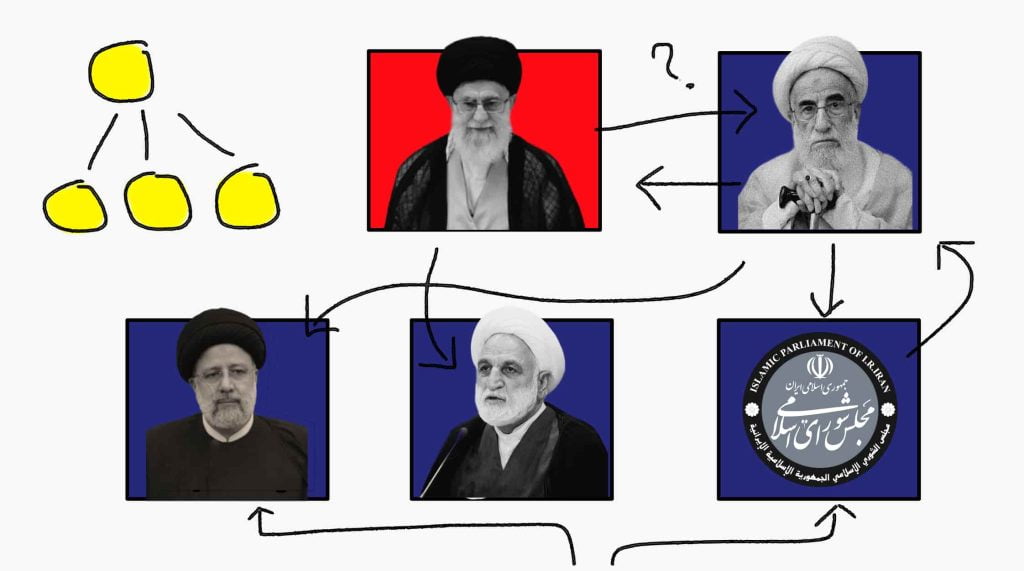
From the Assembly of Experts to the Guardian Council, learn about the complex process of electing the Supreme Leader of Iran, the commander-in-chief of the Armed Forces and the highest authority in the country.
The Supreme Leader
At the top of the hierarchy stands the Supreme Leader of Iran. As this position is considered a life tenure post, there have only been two supreme leaders since the formation of the Islamic Republic of Iran.
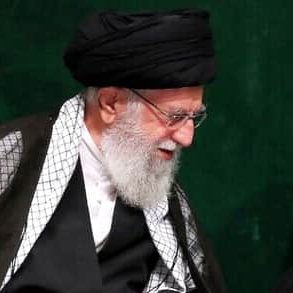
The Supreme Leader is the commander-in-chief of the Armed Forces, and the Legislature, while the Executive and the Judiciary system all operate under his superintendence. In other terms he controls everything and everyone answers to him.
There’s also the Expediency Discernment Council which is responsible for advising the Supreme Leader. All of its 20 members are chosen by the Supreme Leader directly.
The Supreme Leader is chosen by the Assembly of Experts of the Leadership. The same assembly is responsible for removing the Supreme Leader of Iran as well as supervising his activities. It consists of 20 members and all are chosen by the direct vote of Iranian citizens every 8 years.
But do not be fooled! People only get to choose from an incredibly limited number of candidates, all of whom have to be approved of by the Guardian Council. We’ll talk about who the Guardian Council is further down the line, for now just keep track of the number of times the name of this council comes up!
Then there’s what’s known as the three main bodies of the power system; The Executive body, the Judicial body and the Legislature.
The Executive Body
First there’s the Executive body which consists primarily of the President and his ministers. The President of the Islamic Republic of Iran is chosen by the public vote of Iranian citizens every four years. The president’s responsibilities include signing treaties and other agreements with foreign countries and international organisations, as well as administering national planning, budget, and state employment affairs.
The power of the President of the Islamic Republic of Iran is fairly limited and all presidential candidates have to be approved by the Guardian Council! The ministers are appointed by the President himself, but the Islamic Consultative Assembly (the Legislation body) has to approve of the ministers.
The Judicial Body
Then there’s the Judicial body which is responsible for the implementation of justice. This body is entrusted with many duties such as investigating and passing judgement on violations of rights and complaints, supervising the proper enforcement of laws, and taking suitable measures to prevent crime.
The Chief of Justice (head of the Judicial System) gets elected directly by the Supreme Leader of Iran and is reelected every five years, however, it has to be noted that there is no limit to getting elected multiple times, even in a row.
The Legislature
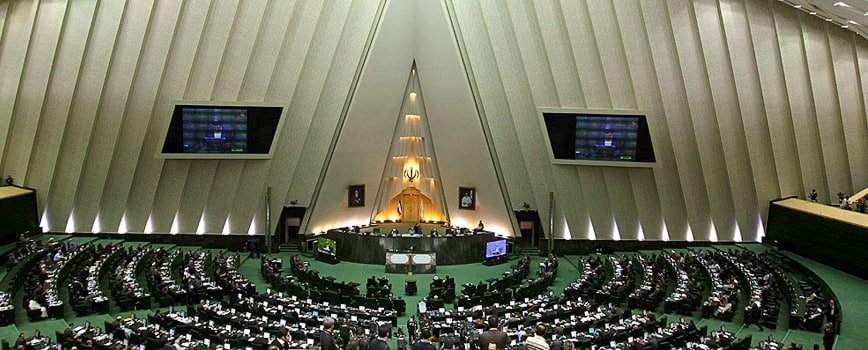
And lastly there’s the Legislature which consists of two important departments: The Islamic Consultative Assembly and The Guardian Council. The Islamic Consultative Assembly is responsible for establishing new laws on all matters within the limits of the Constitution.
The Islamic Consultative Assembly currently has 290 representatives, all of whom are chosen by public vote, but all have to be approved of by the Guardian Council! The Guardian Council is also in charge of reviewing new legislation by the Consultative Assembly and to examine its compatibility with Islam and the Constitution.
The Guardian Council
So, finally we get to the Guardian Council. What, then, is this council that is in charge of approving all candidates, whether they are running for Presidency, the Islamic Consultative Assembly or the Assembly of Experts of the Leadership, before they are put to public vote? Surely this Council is chosen by the people themselves, right? Sadly the answer is a clear ‘No!’.
The Guardian Council consists of 12 members, six of whom are directly chosen by the Supreme Leader. The remaining six get elected by the Islamic Consultative Assembly, so through an indirect vote of the people, but all candidates have to be nominated by the Chief Justice of Iran, who is the head of the Judicial System. As mentioned before he is elected directly by the Supreme Leader!
So, in case you are as confused about this system, as I was when I was twelve, let’s do a recap! The Supreme Leader chooses six out of 12 of the members of the Guardian Council directly, and the other six indirectly through electing the head of the Judicial System, who then will nominate the candidates. The Guardian Council then nominates the candidates for the Assembly of Experts of the Leadership.
In other words, the Supreme Leader indirectly elects the only people that have power over dismissing him! This means that the circle of power is a closed one in Iran and all changes depend on the Supreme Leader.
Can the United Nations Parliamentary Assembly Address Failed State Realities?
By Omar Alansari-Kreger
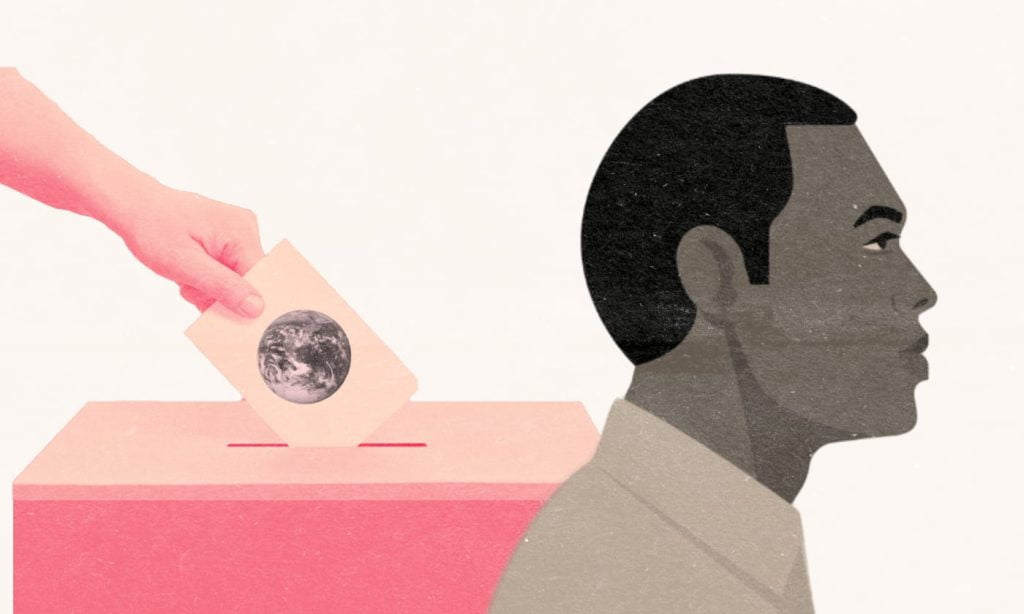
With poverty, corruption, and functional illiteracy affecting many nations around the world, what impact will these challenges have on the potential success of the United Nations Parliamentary Assembly’s proposal for representative democracy?
What can the movement for a United Nations Parliamentary Assembly takeaway from the World Development Index? According to the United Nations Surviving on Pennies Global Awareness Initiative, 1 billion people live on $1.00 daily. We have been trained to localize the concept of gross domestic product by national classification, but on average, how widely considered as the world’s gross domestic product per capita?
As of 2021, Macrotrends reported the world GDP at a meager $11,407 (per capita), less than what the United States Assistant Office of Planning & Evaluation identified as poverty for one person at $12,880 for the same year.
With half the world living on less than $5.50 per day, it is no stretch of the imagination to suggest poverty, in addition to all of its associable limitations, remains a tremendous global challenge.
Poverty is an incubator for corruption when people lack the most basic resources for survival. For billions of people worldwide, securing basic resources of life is an unforgiving hustle when living under failed state conditions.
When referencing Transparency International’s “Corruption Perceptions Index” for 2021, a bleak image is cast over our current global reality.
Low-scoring nations on the index are colored different shades of red. It goes without saying that much of the world map presented by Transparency International for this project is overwhelmingly red for all the wrong reasons.
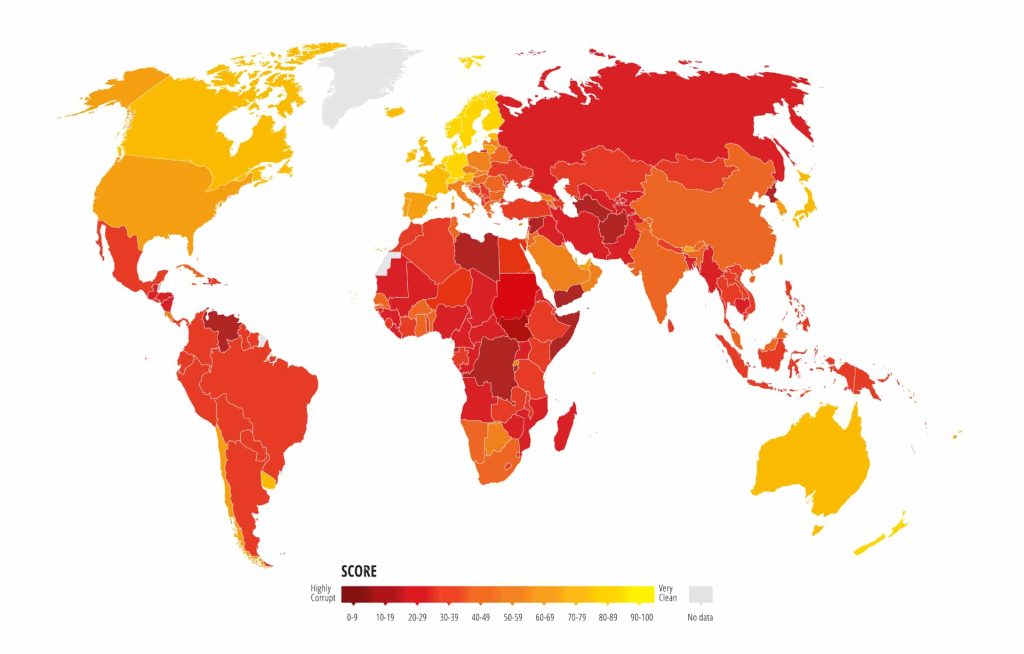
Thus, where there is corruption, there is functional illiteracy where people struggle to gain the most basic form of primary and postsecondary education. Based on data retrieved from UNESCO Institute for Statistics in 2019, 86% of the world is illiterate.
When functional illiteracy, rampant corruption and poverty coalesce as an “existential reality” for any given developmentally challenged nation, what impact will each area have on the dissipation of representative democracy as proposed by the United Nations Parliamentary Assembly?
For example, Somalia has facilitated numerous national elections since 2004 after years of lawless chaos since the start of its civil war in 1991, but as a nation, Somalia remains very much a failed state in 2022 even after the Transitional Federal Government attempted democratic reform.
What is the United Nations Parliamentary Assembly (UNPA)?
The United Nations Parliamentary Assembly (UNPA) is a proposed augmentation to the United Nations system that would consist of representatives of national parliaments from around the world.
The rationale behind the UNPA is to provide a more democratic and transparent decision-making process at the global level by empowering national legislators to have a greater impact on shaping international policy.
Proponents suggest that the UNPA would have a purely consultative role, meaning that it would not possess the authority to make binding decisions on behalf of member states. However, it could provide a forum for discussing and debating global issues and making recommendations to the existing UN bodies.
Some argue that the UNPA could help to address global challenges such as climate change and global inequality, while others have expressed reservations about the feasibility and potential drawbacks of such an institution.
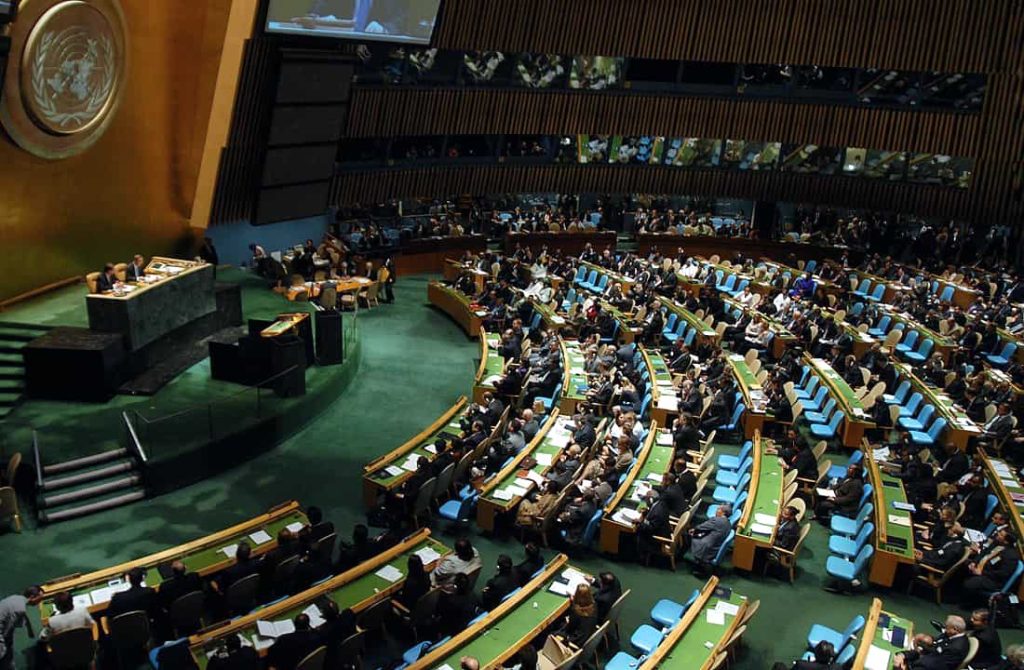
Can elections save failed states under the UNPA mandate?
The question is can elections alone save failed states under ‘supranational democratic processes? It ultimately comes down to a question of enforcement. How will a supranational authority like the parliamentary assembly ensure and above all maintain the necessary transparency, integrity, and authenticity of elections, as well as democratic processes, in failed state realities?
Elections were not restored in Germany until 1949 culminating with the arrival of the first West German National Election after World War Two. Authorities governing Allied-Occupied Germany realized an immediate restoration of democratic processes in Germany after the war before “constitutional reformation” threatened international security. This is true, considering the dangers associated with neo-Nazism. Thus, the Allies effectively had a large hand in creating the Germany we recognize today.
How can the United Nations Parliamentary Assembly offer similar guidance and oversight in failed states where there are little to no democratic institutions, particularly in nations recovering from civil war? Can this Parliamentary Assembly be deployed as a “supranational civilian authority” to stabilize fledgling failed state nations, once recognized as such by national governments?
To achieve any of the aforementioned, the Parliamentary Assembly must identify and establish case-specific criteria to make localizations of representative democratic processes feasible in recovering failed states.
It is for this reason that our realpolitik reality must be acknowledged in all of its absolutism. To date, we have yet to escape Machiavellianism, considering unilateral actors turned geopolitical bullies seize power by military force or diplomatic blackmail with near impunity and zero accountability.
Is a world federal democracy feasible? Key questions we must ask
Is representative parliamentary democracy the best method available to channel democracy directly to underrepresented peoples, and communities, in failing state demographics worldwide by “U.N. Parliamentary Intervention” as a general deterrent against realpolitik? Beyond elections, what alternatives are available? How will it be possible to convince people struggling in failed state squalor that representative democracy is not tyranny by the majority?
To make world federal democracy possible, a series of investigative albeit critical questions must be raised to question the overall feasibility of practical implementation.
- Do democratic elections provide the best possible outcome considering the arbitrary nature of national elections in even the most developed nations like the United States?
- How can functional illiteracy serve as a working antithesis to representative democracy as advocated by the parliamentary assembly?
- What protections can a potential parliamentary assembly field against corruption from localized cronyism such as election rigging and vote buying?
- Can lobbyists, turned political action committees, be regulated by an ethics committee under the direct supervision of such a supranational parliamentary body to maintain integrity and transparency?
It is often found that more questions are raised than answers provided when attempting to evolve solutions to endemic problems without an overabundance of idealism.
A future U.N. Parliamentary Assembly must be dedicated to building developing nations; first, to protect against failed state pitfalls; and second, if there is any realistic expectation of any becoming democratic.
Dante Alighieri’s Vision for World Government: The Pathway to Abolishing War
By Ted Daley
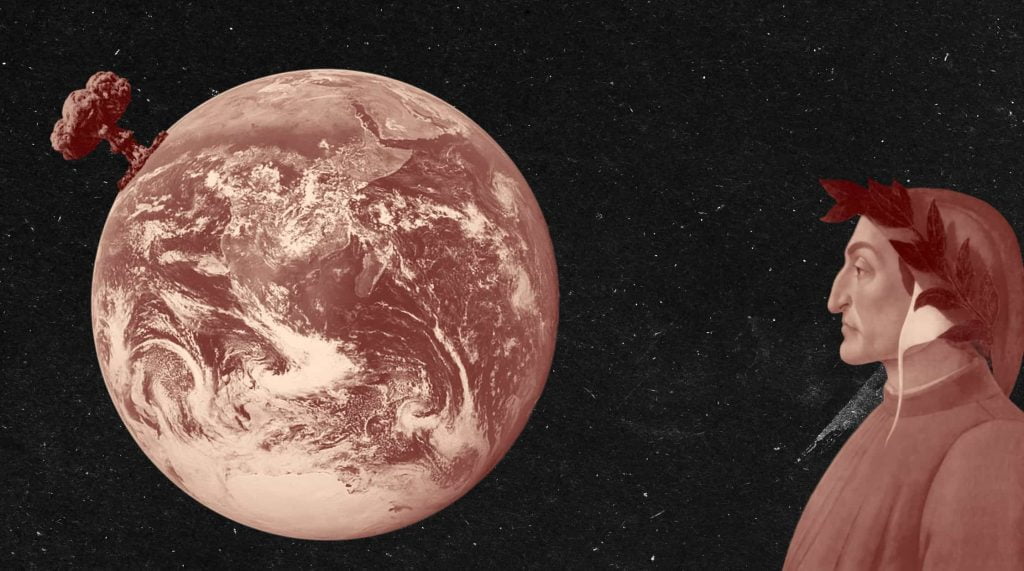
Dante’s death 700 years ago marked the end of an era. But his lasting legacy may be his vision for a world government, outlined in his work De Monarchia. Written in 1313, this work may be the first literature to present a comprehensive solution to the problem of war.
How the age of self-discovery changed the English poetry and the novel forever
By Alex Liberto
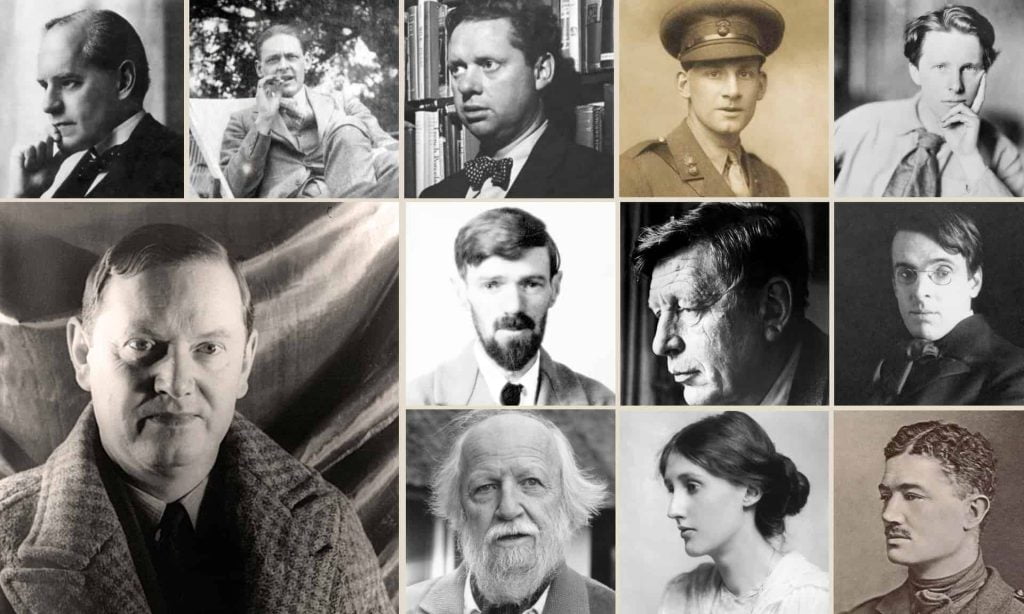
The Age of Self-Discovery was a milestone for the English poetry and novel that opened the doors for the intellectual creativity and innovation of 20th-century writers.
Literature during the Victorian Era identified itself with the ethical values of that society. The superficial optimism and bigotry of a self-righteous attitude forged a kind of literature that was condescending and emotionally wanting.
Apart from the few exceptions like Emily Bronte’s Wuthering Heights, most of the production of that period lacked the emotional intensity or the daring experimentation of writers belonging to other periods.
The tide began to change during the last two decades of Victoria’s reign, when some writers sought a newer and fresher approach to literature.
The end of the century brought about writers like Oscar Wilde, who broke away from Victorian tradition through aesthetic and decadent models, or like Hardy and Conrad, who were close to naturalistic and existential themes.
It was, however, the First World War which triggered in man an awareness to see life as an abyss of incessant self-discovery. The trauma which the Great War had caused revealed new feelings and shattered traditional values and ideals.
The Poetry
The direct fruits of the age of self-discovery were the war poets like Wilfred Owen, Rupert Brooke and Siegfried Sassoon. They expressed the disillusionment of those thousands of young soldiers who went to war with courage and heroism in their hearts and who ended up realising how insane and futile the war actually was.
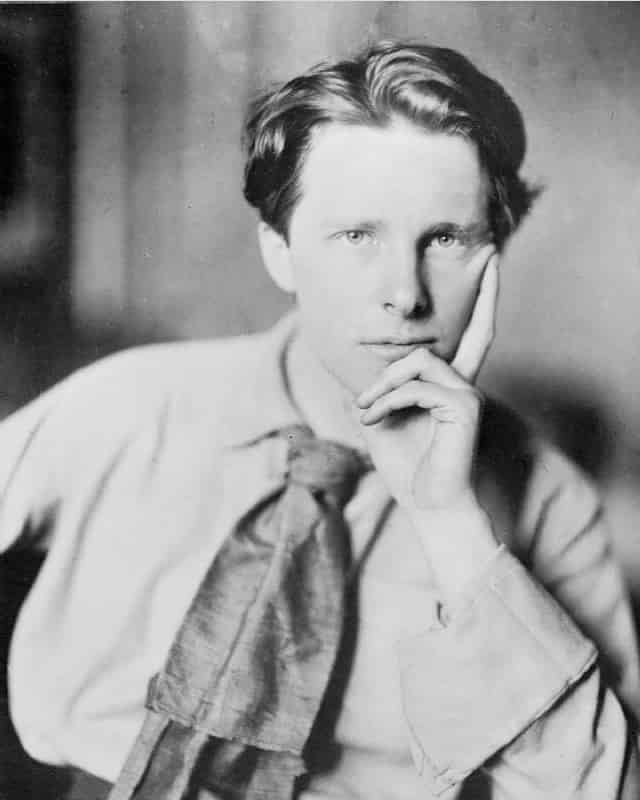
In 1915 Rupert Brooke died, in active service, of blood poisoning on his way to the Dardanelles at the young age of 28. His poems and his extremely handsome good looks instantly made him the typical romantic hero of that generation. His Poem The Soldier seemed to have been prophetic:
If I should die, think only this of me:
That there’s some corner of a foreign field
That is forever England
Another young poet, Julian Grenfell, had also written a prophetic poem which was published in The Times the same day he was killed in battle in the dreaded trenches in France. His poem Into Battle cried:
If this be the last song you shall sing,
Sing well, for you may not sing another.
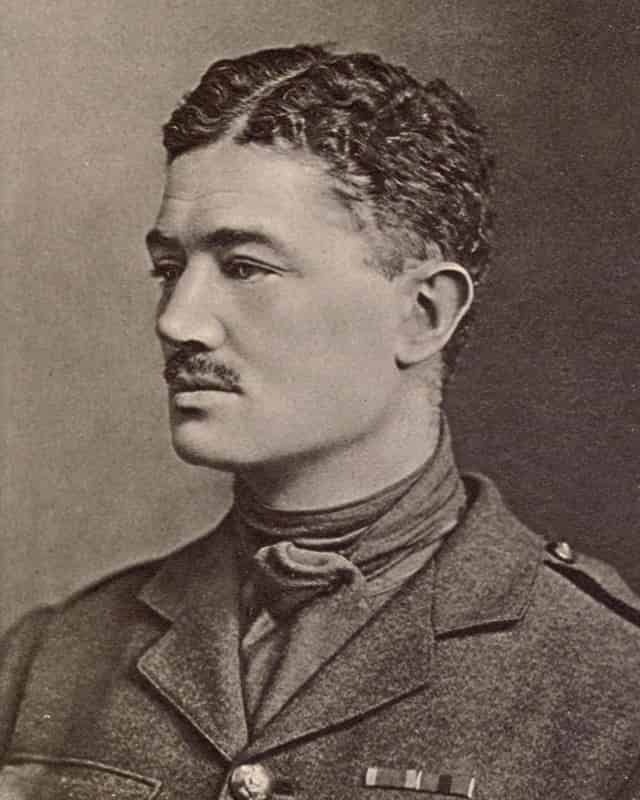
Other soldier war poets who were killed were Edward Thomas, Isaac Rosenberg and Wilfred Owne. War was the essence of their poetry. Owen wrote:
“My subject is war and the pity of war… The poetry is the pity”
Thomas wrote about the horrors of the war through his memories of the tiny English country station Adlestrop, on a hot summer’s afternoon. Rosenberg had published Night and Day in 1912 and had written a type of poetry which could be termed as confessional. He was killed in France in 1918. Wilfred Owen, who is probably the most well-known and widely read war poet, was also killed in 1918. He wrote the memorable lines:
“My friend, you would not tell with high zest
To children ardent for some desperate glory,
The old lie: Dulce et decorum est
Pro patria mori”.
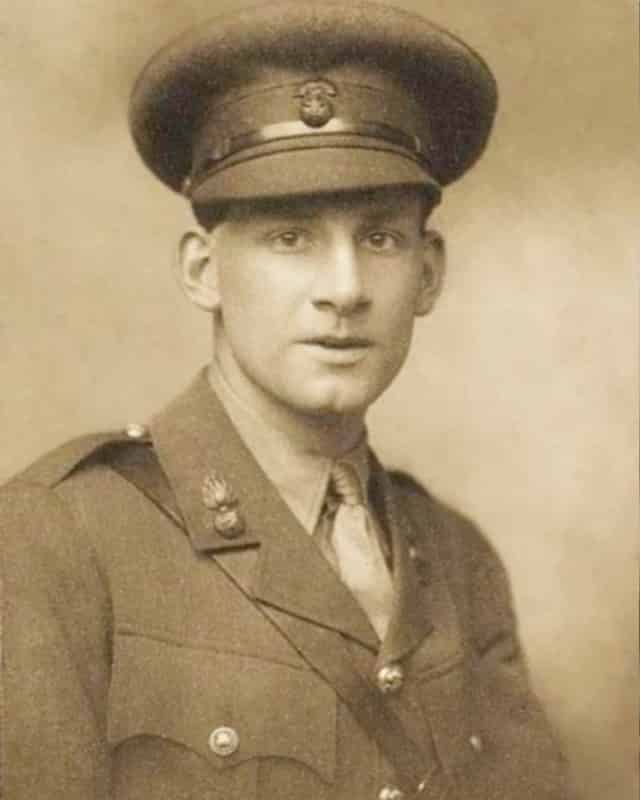
The most famous war poet who survived the Great War was Siegfried Sassoon. He lived to the venerable age of 81 During World War One he was known as Mad Jack because of his daring solitary expeditions. He was the first poet to express his disapproval and disgust of the horrors of the war.
He wrote of “the unreturning army that was youth” and of “the simple soldier boy” who shot his brains out. This type of writing really shocked the English patriots of his society.
Sassoon’s best poems which expressed his feelings against the war were collected in Counter Attack and Satirical Poems. Later in life Sassoon could never forget the tragedy of the First World War, and wrote nostalgic autobiographical works which were very touching.
Generally, however, post-Victorian poetry stemmed mainly from two major traditions: the symbolists of the late 19th century and the metaphysical school of the late 16th century.
The symbolists
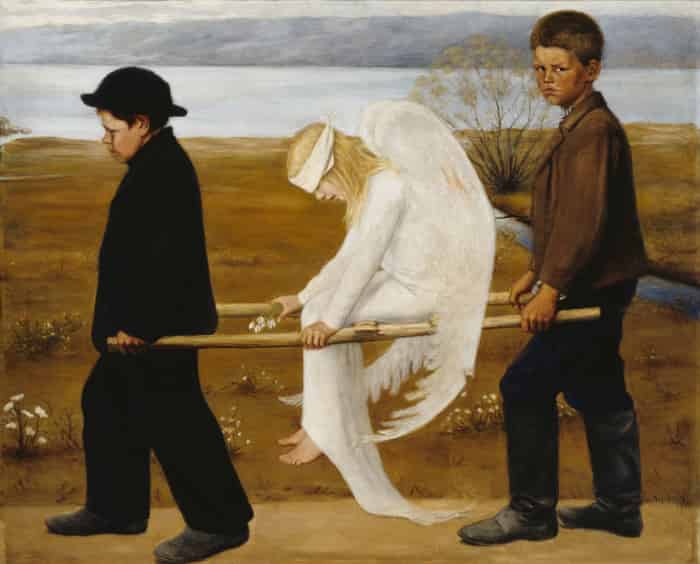
On the one hand, the former school of poetry, whose main founder was Eitienne Stephane Mallarme, expressed its poetic inspiration through intuitive and suggestive expression.
The poets represented their ideas through symbols associating images, feelings and emotions with specifically invoked elements. One of the main poets belonging to this group was Dylan Thomas.
Read more: Towards the Third Millennium: UK literature after the Second World War
Thomas’ work was complex and difficult to understand. It was not, however, intellectually complex. Its difficulty lay in the elaborate and obscure imagery and the allusive style. Dylan Thomas was considered to be a new romantic as his themes were generally based on romantic notions of love, nature and humanity. His poetic structure was always musical and mellifluous.
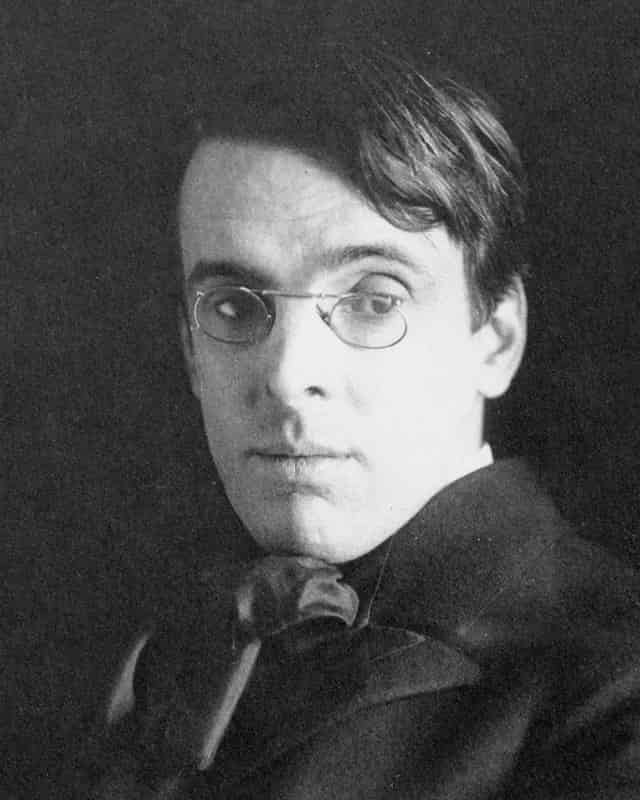
Another poet who was influenced by the French symbolist movement was William Butler Yeats. His poetry owed a great deal to Mallarme, Baudelaire and Verlaine. Yeats, who has become one of the leading 20th-century poets, used a great deal of obscure imagery and symbols.
His work revolved around theories, philosophies and mysticism. His mystical side developed in the light of his studies on William Blake, whose works he admired greatly.
The metaphysical school
On the other hand, the latter school of poetry, whose main founder was the 16th century poet John Donne, created a poetry of terse, almost scientific analysis.
Read more: Your Full Guide to John Donne’s Life, Career & Poems
Metaphysical poetry was intellectually difficult and very down to earth in its creative expression. The precise and scientific imagery of this literary school went against the romantic vision of life. The analytical and anti-romantic conceits used by the Metaphysical Poets were paradoxical comparisons which equated a potentially romantic idea, emotion or situation to something down to earth, factual and precise.
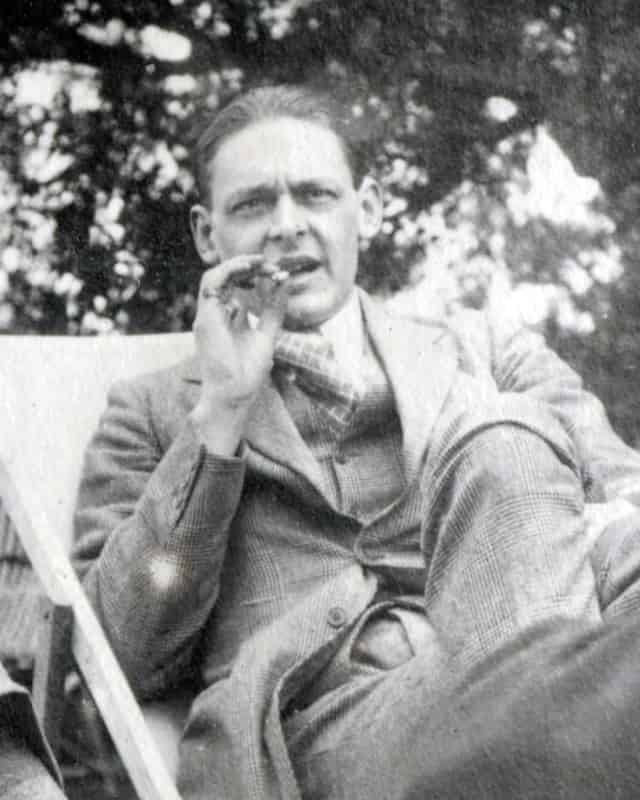
The main exponent of this school in the 20th century was undoubtedly Thomas Sterns Eliot, whose rebellion against 19th century romanticism and Victorian convention was the essence of his poetic output.
Read more: Your guide to T.S Eliot poems
He was the neo-metaphysical par excellence. Examples of the anti-romantic similes are his comparisons between “the evening” to “a patient etherized upon a table” found in The Love Song of J. Alfred Prufrock, or between the typical human emotion of anxiety to “a taxi” waiting impatiently, found in The Waste Land.
Eliot’s reaction to the contrasting years of bloodshed and aloofness was more existential, focusing on the lack of values and meaninglessness of life.
He managed to capture the feelings of futility, senselessness and degradation of his contemporary society. He looked at the past by highlighting the grandeur of its simple values, ideals and artistic creativity. Through the exaltation of that grandeur he managed to focus on the aridity and dullness of his society.
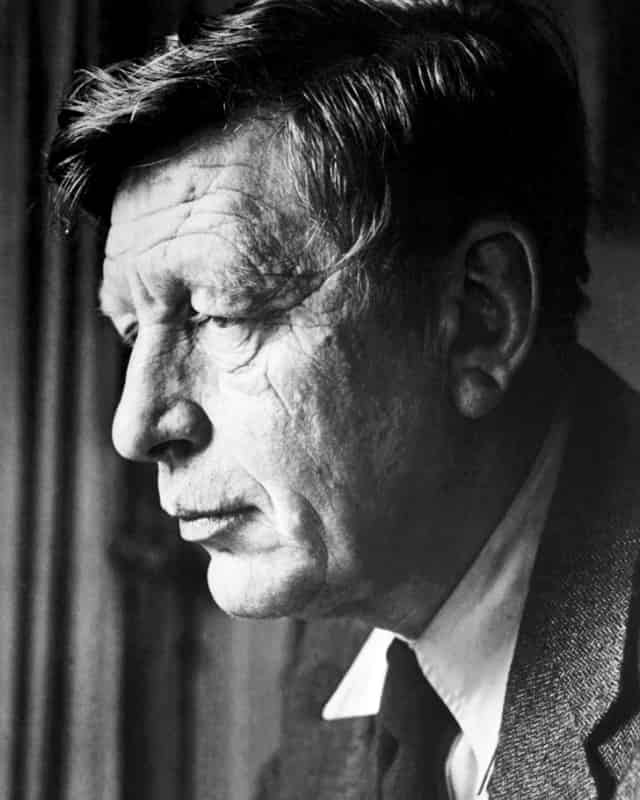
Another poet whose experimental creativity helped revitalise the art of poetry was Wystan Hugh Auden. He, too, felt strongly about the emptiness of his society but his work had a more socio-political slant, focusing on themes like the Spanish Civil War and Nazism.
Auden was considered to be one of the Progressive Poets of the 1930s and his fame was secured from his very first collection published by Eliot’s publisher, Faber & Faber, in 1930 and simply entitled Poems.
The Age of Self-Discovery was really quite a turning point for poetry. The art of writing poetry found fertile ground for innovation and experimentation in that post-Victorian society, which had had enough of convention and tradition. The devastation of the Great War and the declining values of an increasingly sterile society did the rest.
The Novel
Like poetry, the novel was also in need of new dynamic energy by the end of the 19th century. Since Defoe, Richardson or Fielding, the development of the novel had been steady, but not particularly adventurous in the innovation of style and structure. Tradition and convention were the basis of the Victorian novels which, although having fresh and interesting elements regarding content, were always standard in the presentation of their stories.
The Age of Self-Discovery instilled a creative urge within the novelists to discover not only their existential position in a life, emptied of sound ethical values and tradition, and marred by the ruthless massacre of a futile and senseless war, but also to discover new means of self-expression. The early 20th century development of the novel, which was linked to this revolt against tradition, is often termed ‘modernism’.
Modernism and the stream-of-consciousness
The two giants who really shook the pillars of convention in the world of the novel were James Joyce (1882-1941) and Virginia Woolf (1882-1941). Their tools of innovation were the Stream-of-consciousness and the interior monologue.
The use of the stream-of-consciousness technique is by far the literary device which added new dynamic freshness and vigour to a genre which was long due for renovation. This technique actually belonged to the world of psychology.
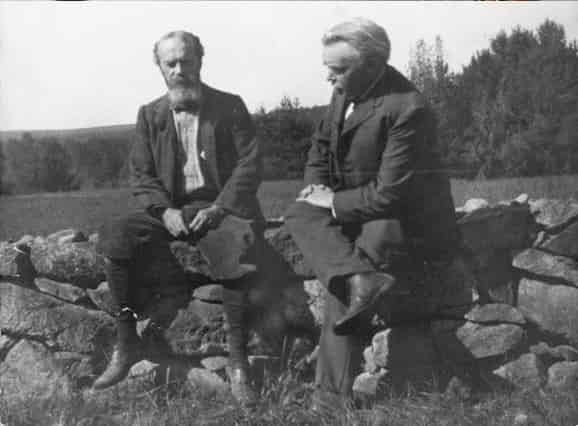
The psychologist William James, brother of the American author Henry James, had used the term stream-of-consciousness to describe the haphazard gushing of emotions, memories, thoughts and perceptions which take place within us without following a logical or chronological order. William James explained this in The Principles of Psychology (1890). His theory was that a confused succession of memories and feelings could be suddenly brought on in one’s mind by external stimuli like music, perfumes or even just a banal action.
The distant music of a familiar song could, for example, remind you of an incident which had happened years earlier while listening to the same song. In your mind those memories, and the emotions linked to them, mingle with the present situation. In your mind, past, present, mixed emotions and perceptions simultaneously unravel.
This kind of experience is psychologically inherent within man and therefore the most daring experimental writers found that it should be transferred to the world of literature.
Basic external realism, they believed, did not really capture the true essence of life.
Structural events in a novel were seen to be limiting, while the turmoil and haphazard development of the mind’s random flow of thoughts and emotions were, on the contrary, seen to be the true complex reality of man and his world.
At first, the novels written with this technique were very difficult to understand and seemed to make no sense. However, once the reader grasped the objectives of the author, the picture as a whole became coherent. A perfect example of the brilliant use of this literary device is Ulysses, written by James Joyce.
This is the story of a man’s day in Dublin. It is one of the first great mythopoetic novels of the 20th century. The first pages of the book will confuse the reader, who may find the novel extremely difficult to understand, but once the reader appreciates the fact that the book does not focus on external plots and intrigue, but rather on the exploration of the intimate psyche of the characters, the value of the novel becomes apparent.
The work provides a masterful glimpse into the stormy enigma of the human mind. It reveals psychological reality and paves the way to a greater understanding of life in general.
Joyce also exploited the interior monologue, which is the pouring out of a character’s thoughts and feelings, usually expressed by the character himself/herself. Sometimes, however, the interior monologue is recounted by a narrator in the past tense. Whichever way it may be, this device is a splendid way of opening a door into the mysteries of the character’s intimate soul and mind.

The works of Virginia Woolf added a personal touch to the stream-of-consciousness and interior monologue with the introduction of the “she/he thought”.
Read more: Unlocked and Unbolted – Virginia Woolf’s Life and Works
Woolf completely rejected the traditional concept of the novel. Her belief was that a novel should “record the atoms as they fall upon the mind in the order in which they fall (…) trace the pattern, however disconnected and incoherent in appearance, which each sight or incident scores upon the consciousness.”
She believed that novels should not “preach doctrines, sing songs, or celebrate the glories of the British Empire.” Her novels most certainly did not. They explored the inner labyrinths of the mind and soul of her characters with profound lyrical intensity mixed with a virtual scientific interpretation.
Her brilliant Mrs.Dalloway, for example, described one day in the inner world of Clarissa Dalloway. It is a deep analysis of three major characters who reveal their innermost perceptions and feelings through Woolf’s acute sense of experimentation with the characters’ train of thoughts. Her lyrical musicality and rhythm is characteristic of her work and blends well with her stream-of-consciousness technique.
The best example of this union is found in The Waves, which is a very poetic development of the lives of a group of friends from childhood to adult life.
Virginia Woolf formed a group called the Bloomsbury Group, named after the residential London district where the friends and writers used to meet in 1906. All shared similar artistic and intellectual interests. A member of this group was Edward Morgan Forster (1879- 1970) who wrote the memorable novels Howards End (1910) Maurice (1913-14) and A Passage to India (1924).
Read more: Edward Morgan Forster: Life and works
These novels portrayed vivid pictures of the well-to-do English society, focusing on the depth and psychological development of the characters.
Other authors of that period who studied the upper-class English society were John Galsworthy (1867-1933), who wrote The Forsythe Saga (1906/21), and Evelyn Waugh (1903-1966), whose most famous works are Decline and Fall (1928) and Brideshead Revisited (1949).
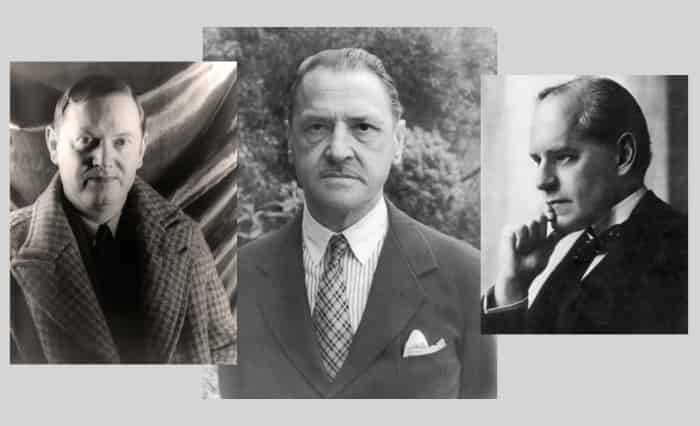
Evelyn Waugh’s insight into man’s psychology was quite astounding. Sebastian in Brideshead Revisited has mesmerised many readers. The young aristocrat’s soul-searching quest for self-fulfilment and understanding was a perfect picture not only of the type of society he belonged to but also of human psychology in general.
Another author who delved into human psychology was William Somerset Maugham (1874-1965). His type of experimentation lay in his studies of the complexities of human sexuality. One of his best novels, Of Human Bondage (1915), is a painful attempt to come to terms with his own bisexuality. The clubfoot of Philip, the protagonist, is a symbol of how Maugham viewed his own ‘crippled’ sexuality.
Freudianism in literature

During this period some novelists were also picking up their inspiration from Sigmund Freud, who gave dreams and sexuality a new important position in a psychologically based vision of life. Freud didn’t think much of the surrealists, but their leader André Breton got his inspiration from him.
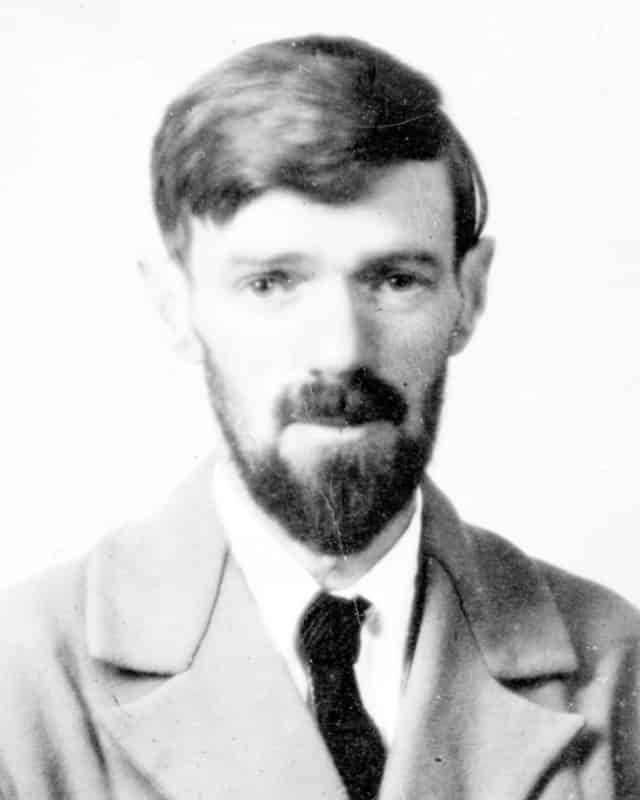
Together with Freud’s view on the world of dreams came his view on traditional morality. His works on psychoanalysis and his studies on sex inspired, in particular, David Herbert Lawrence (1885-1930) who believed in instinct rather than logic.
Read more: David Herbert Lawrence – The Freudian who hated industrialisation
His books, like Lady Chatterley’s Lover, shocked society. Many of his books were censored and rejected as obscene. Lawrence believed that sex between man and woman was ruined by the intellectualisation and logical analysis of it. This type of “sex in the head” as he put it, interfered with instinct and therefore with ultimate happiness.
The dystopian and utopian
Later on in the century, from the 1930s onwards, came the dystopian novel. The dystopian novel, that is the anti-utopian novel, highlighted the dangers which could be awaiting man in the future with a frigid and perfect society void of any human values.
The word utopia, in Greek meaning nowhere land, refers to a book written by Sir Thomas More (1478-1535), in which the author presents a perfect society. The book written in 1516 describes an ideal world in which everything is perfect. The dystopia, in Greek meaning bad place, highlights the negative and dangerous qualities of a would-be perfect society. The two main writers who chose this genre were Aldous Huxley (1894-1963) and George Orwell (1903-1950).
Brave New World, written by the Aldous Huxley, was obviously a clear example of dystopia. The scientifically perfect society of the Brave New World reflected the dangers of its cold and empty human values.
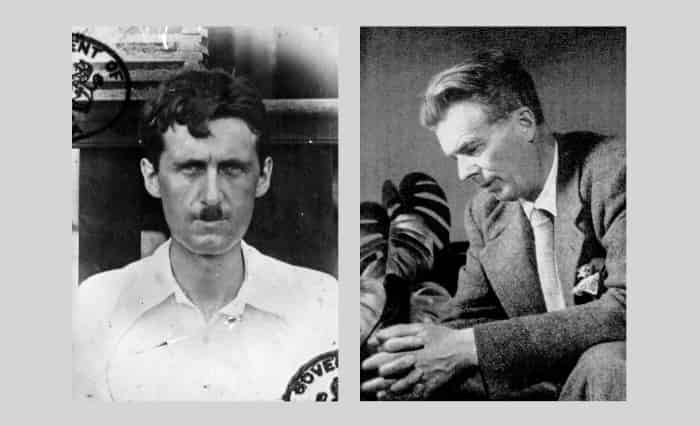
George Orwell, on the other hand, expressed the dystopia by focusing on totalitarian regimes and their despotic society. Nineteen Eighty-Four is a perfect example of this type of totalitarian world, in which Big Brother kept a vigilant watch over everybody. Individuality in this world became a crime and people were seen as mechanised dummies:
His head was thrown back a little, and because of the angle at which he was sitting, his spectacles caught the light and presented to Winston two blank discs instead of eyes. What was slightly horrible, was that from the steam of sound that poured out of his mouth it was almost impossible to distinguish a single word. (Nineteen Eighty-Four).

The dystopian novel was also present after the Second World War in the 1950s with William Golding’s, The Lord of the Flies.
All in all, it can safely be said that the Age of Self-Discovery was a milestone for the English novel. The new techniques and experimentation established a new relationship with literature.
The doors, which had long been ajar, were finally opened for the intellectual creativity and innovation of the 20th century writers.
In the next issue we shall be surveying the development of drama during this period.
Poems for a Better World: 86 Billion
By Ayesha Dawood
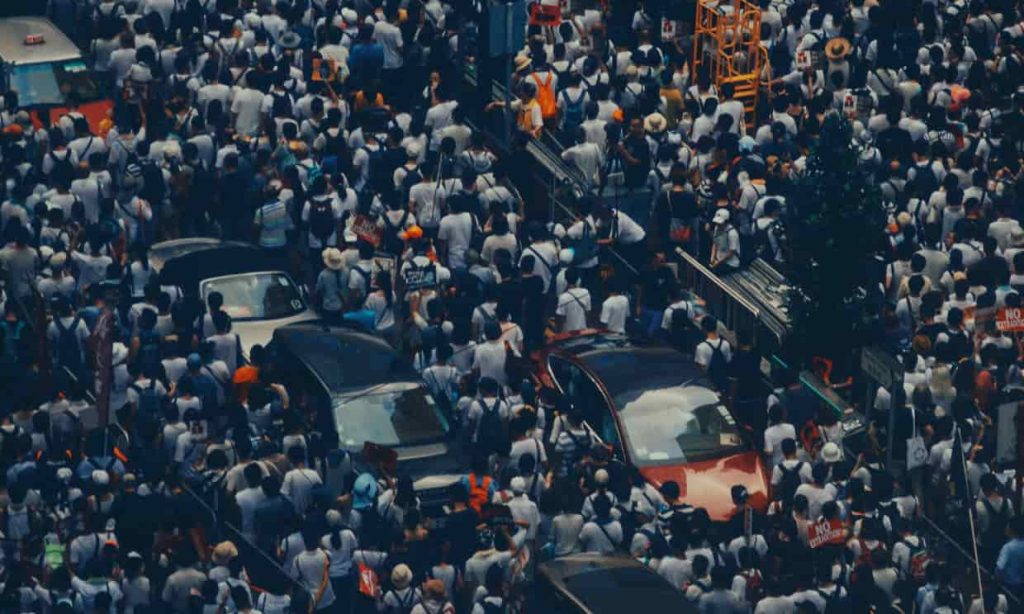
In “Poems for a Better World,” we showcase poems that inspire hope and possibility, that call for justice and equality, and remind us of the beauty and resilience of the human spirit. Through the power of words, these poems offer a glimpse into a better world, one where love and compassion triumph over hatred and division. Join us on this journey of discovery and inspiration.
Pamfilo of Magliano: The story of great uncle, Giovanni Paolo Pietrobattista
By Carla Pietrobattista
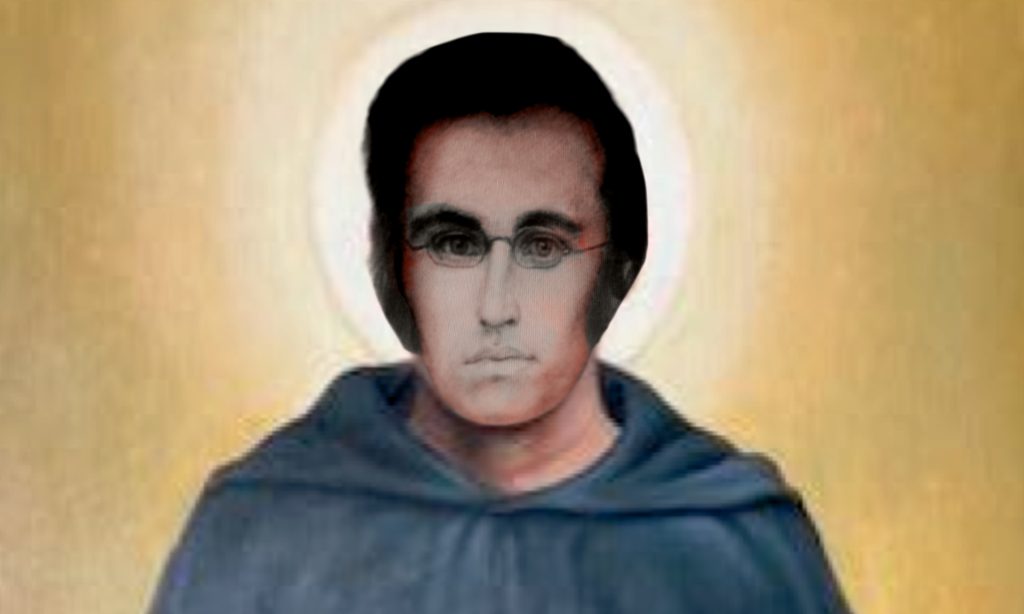
Pamfilo of Magliano (Giovanni Paolo Pietrobattista) was a Franciscan friar who lived a life characterised by intelligence, determination, and resilience, writes Carla, Giovanni’s great niece.
The story of Giovanni Paolo Pietrobattista, although chronologically distant, are incredibly close, because their protagonist was my great uncle. Despite never having met Giovanni Paolol, he is very dear to me thanks to the stories my grandmother and my father have shared with me. Nor only have they instilled in me admiration for what my uncle had been able to achieve, but also a strong affection and empathy towards him.
I really care about this story and though I know what I want to relate, I have stopped and started so many times that I feared I would not finish it.
My initial idea was to draw a personal picture of the history of Giovanni Paolo, but then I felt it was right to insert some historical information in order to give the right objectivity that every study, intended for common reading, deserves.
So, to broaden my knowledge, I typed my uncle’s name on the internet to look for other data to add to those already in my possession. A sort of synthesis of the religious life of Giovanni Paolo came out which presents him as an exemplary Franciscan. The adjective ‘exemplary’ kept coming back to me more than I would have liked, but ultimately I think it encompasses much of what he was.
Giovanni Paolo lived a life between tradition and innovation, with originality and awareness, in a way that offers an example to everyone. His story is not only a window into the past, it is above all a light for the future. His was an existence characterised by intelligence, determination and resilience; qualities that should accompany anyone with dreams for a better future.
The early life of Giovanni Paolo
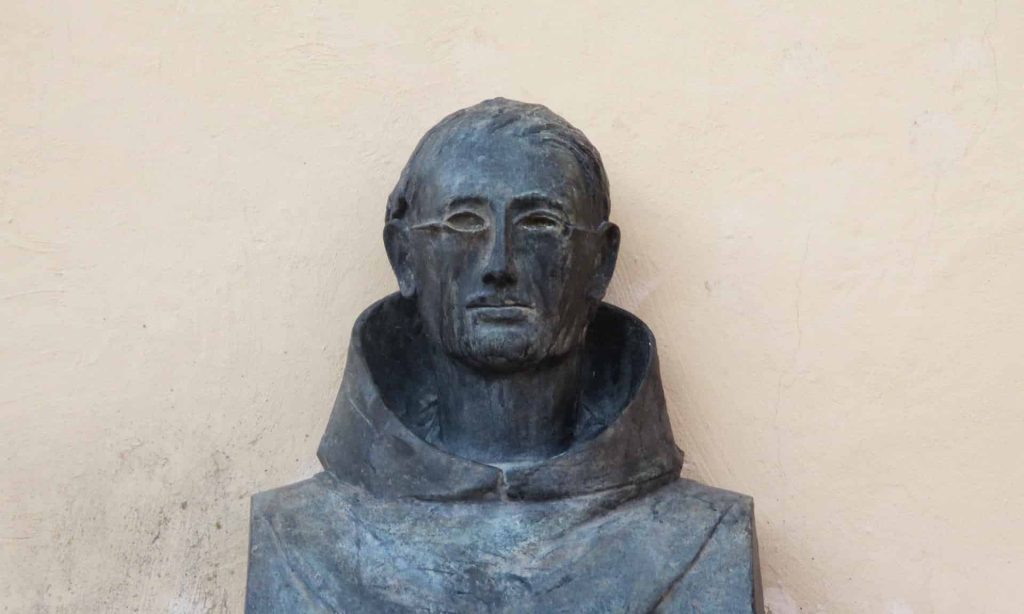
Giovanni Paolo was born in Magliano dei Marsi in Abruzzo, in the same house that I now live in, on April 12, 1824, and he passed his youth in a rather serene family atmosphere. He immediately manifested a great intelligence, curiosity and open-mindedness that led him to undertake a personal path that I would define as both traditional and revolutionary, particularly with regards to some of the uncommon subjects that he decided to pursue.
Giovanni Paolo’s meeting and associating with the Franciscan community in Magliano dei Marsi at an early age proved life-changing. The friars resided in the convent of San Martino, where they managed what in ancient times was the most important religious establishment in the vicinity.
In this structure, no longer in existence due to the massive earthquake that rocked the area in January 1915, the friars welcomed and gave assistance to anyone in need. The charisma of the friars that brought them close to the whole community, inspired Giovanni Paolo to become part of the Franciscan order.
Pamfilo was an appropriate name he choose for his new life
On July 5, 1839, my uncle began his journey in the Province of San Bernardino da Siena in Urbino, choosing the name of Panfilo for his new life as a member of the clergy. This name of Greek origin is composed of two terms: pan, which means everything and, philos, which means friend: indeed, friend of all or, benevolent towards all. Never was a name more apt, given the subsequent history of Panfilo.
Once he became a friar, Panfilo immediately received the chair of Philosophy and Theology at the convent of the order and remained teaching in Urbino until 1852, when he was invited to go to Rome as secretary of the Minister General of the Franciscan Order.
By December 8, 1852, Panfilo was teaching both philosophy and theology at the Irish College of St. Isidore in Rome and he remained there until January 4, 1855. During this period, Uncle Panfilo was able to improve his knowledge of English, whose rudiments he had already picked up on his own initiative.
Nowadays knowing and speaking English is certainly not uncommon, but in those times the study or knowledge of this language was not so widespread outside the British Empire. In Italy most academics dedicated themselves mainly to the deepening of classical languages, or to the study of French.
Giovanni Paolo, however, understood that for him the knowledge of this language was fundamental. It was precisely the perfect command of the English language that allowed Panfilo to pronounce the most important word of his life! A simple ‘yes’, pronounced without hesitation, to a request that came all the way from America.
Immigration to America
The bishop of Buffalo, John Timon, needed additional support in order to be able to assist the American faithful and above all the new faithful that were arriving from Europe.
Bishop Timon found himself presiding over his community in a historical moment of great social and cultural transformations, during which millions of men and women, due to various emergencies, mainly of an economic nature, were forced to leave the old continent to seek their fortune in the Americas.
From Italy alone, for instance, more than four million people landed in the United States between 1880 and 1915, while a constant flow of Irish had been immigrating to America in search of new opportunities since the potato famine that struck their country in the 1840s.
To meet the multiple needs of the growing number of Catholic migrants, Bishop Timon turned directly to Rome, and in particular to the friars of the Irish College. This was partly thanks to the support he was receiving from the Irish Nicholas Devereux, a man who after leaving his home country had become a successful financier and banker in America.
Most likely the request for help did not obtain the result imagined, because the ‘yes’ to this call did not come from an Irishman, but from a young Italian full of hopes and dreams, together with the strength and faith to transform them into reality. This was precisely Father Panfilo from Magliano.
Panfilo was accompanied by Sisto da Gagliano, Samuele da Prezza and Salvatore da Manarola and the importance of their mission was underlined by the fact that the three clergymen received the personal blessing of Pope Pius IX before leaving.
Father Panfilo had previously collaborated with the pontiff, since he was among the experts who had been chosen for the definition of the dogma of the Immaculate Conception of Mary.
My uncle arrived in New York on June 20, 1855 and from there he first moved with his travelling companions to Ellicottville, where they were guests at a house that still stands, and then to Allegany in the State of New York.
It is in this city that Panfilo and the friars who were under his guidance began their mission by providing spiritual assistance to the faithful whose parishes had remained without a guide.
Notable achievements
However, Panfilo’s spirit of initiative was too great to be limited to this. My uncle founded convents, two academies and religious congregations, such as the Franciscan nuns of Allegany.
Thanks to his incessant work, the county where he worked was enriched with 22 missionary churches; five parishes and a seminary.
As far as I am concerned, though I expect that I am not alone in this assessment, the true masterpieces of Uncle Panfilo were carried out between 1859 and 1861.
In 1859 Panfilo founded, and was the president of, the Saint Bonaventure University, a prestigious college that now has more than 2,000 students.
Then, in 1861 he founded the Franciscan Congregation of Immaculate Conception, of which he was also the first superior, and which went on to found schools and hospitals in other parts of the Americas.
Panfilo also worked to involve lay women in the life of the order, providing them with guidance and above all involving them in a school education addressed to the local population. After this, Panfilo went on to found the order of the Franciscan nuns of Joliet, Illinois in 1863, with a contribution from the town of Magliano dei Marsi.
Sudden return to Italy
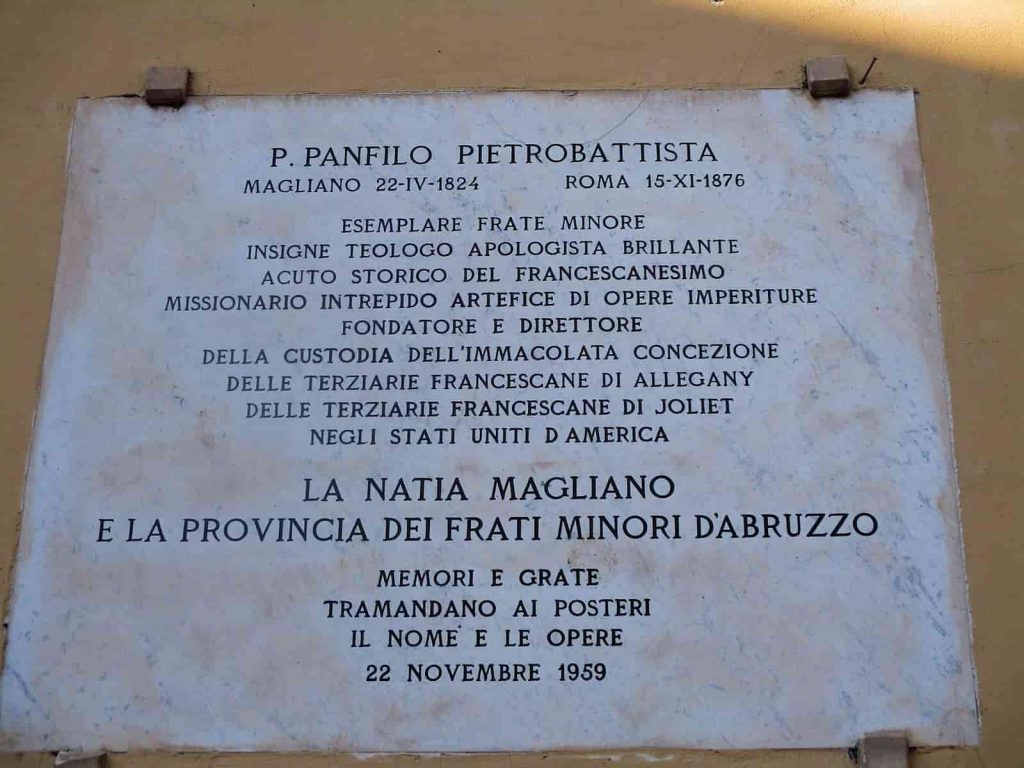
Suddenly, in 1867, and without too many explanations, Panfilo was recalled to Italy. After his arrival he learned that his summoning to Italy was due to misleading information that had been provided by a jealous friar.
The misunderstanding was soon cleared up, but by now Panfilo had already been replaced and for this reason he had no way of returning to America.
Obviously, this was a hard blow for my uncle’s ministry, but he knew how to exploit other aspects of his vocation by dedicating himself to writing and translating texts. In 1870 he published The Greek Church and the Procession of the Holy Spirit from the Father and the Son and in 1874 he translated Cardinal Henry Edward Manning’s The Temporal Mission of the Holy Ghost: Or, Reason and Revelation into Italian.
In 1876 he published the first two volumes of the Compendious History of St. Francis and the Franciscans; the third volume of which was left unfinished because on 15 November 1876 he died in Rome, almost certainly due to a tumour.
I do not deny that I would have liked to look for the name of the friar who managed to get Giovanni Paolo back to Italy, but then I realised that this search would have been useless because the historical truth and the authenticity of Panfilo’s vocation, his works and the enormous cultural heritage and affection he left in America.
A legacy that I touched firsthand during a visit to Saint Bonaventure University. On that occasion I took a tour of Panfilo’s landmarks which represented a profound, almost introspective experience for me; a journey that allowed me to visit places and establishments that I had never seen in person, but that somehow felt mine, because in my own way I had already lived them through stories and research. It was like that intimate feeling of being back home.
Opinion: Don’t let technology become a bane for future generations
By Sailaja S.P

The negative impact of technology, particularly on children, cannot be understated. For our wellbeing’s sake, we need a healthier balance, argues Sailaja.
Obituary: Ayten Aydın
By Adrian Liberto
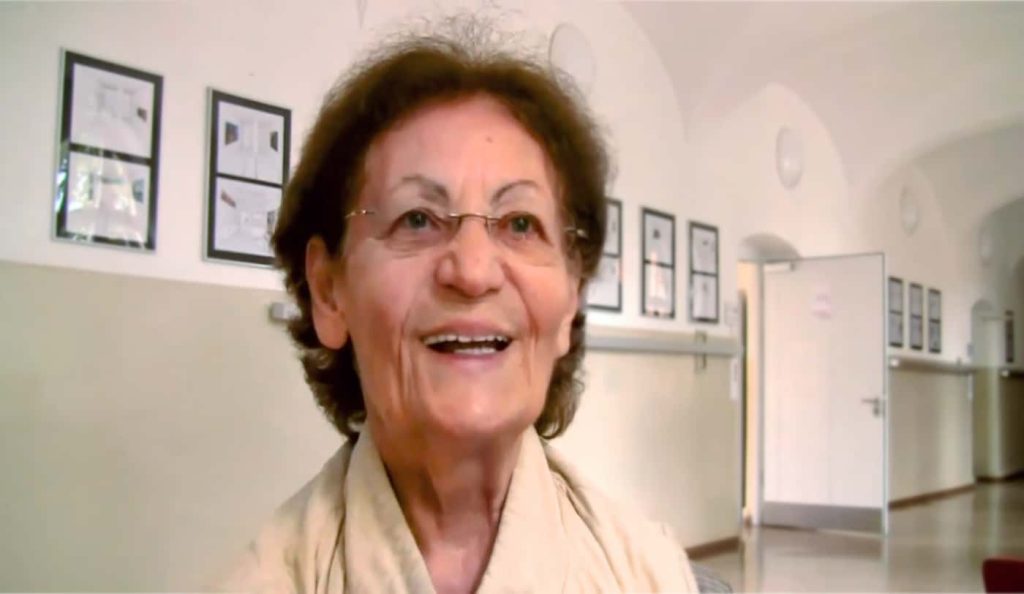
Ayten Aydin, former writer for The Gordian, has died in Rome aged 92 after a short illness.
Ayten was born in Turkey and started her career in Istanbul where she had graduated as a civil engineer in 1951. She worked as a hydraulic engineer, mainly with the State Hydraulic Works, improving the infrastructure relating to land and water development throughout the country. In 1966 she joined the United Nations and worked at the Food and Agriculture Organisation (FAO) in Rome on global projects relating to urban development.
After her retirement she became involved in various humanitarian and cultural causes, both individually and in partnership with international organisations, working until the end of her days with undiminished fervour. As a celebration of her life, her is a selection of quotes taken from the above-mentioned book:
“[M]arginalised and exploited people start entrenching themselves blindly to ideologies, ethnic and/or religious identities and hiding gradually in their ghettos, creating slowly but surely impermeable closed systems to live in. The real result is hatred, struggle and war among people, nations and other groups with different identities.”
“The single, unifying principle encompassing all aspects of natural change is the concept of energy flow as guided by the second law of thermodynamics – energy movement. It may be one of the candidates responsible for change. Necessity and Chance interplay in the process of evolution. Thus it is a process of determinism and chance.”
“Art and culture are positive forces in the evolution of empathy, by telling at their core, stories about the human condition, thus feeding our basic instinct for empathy.”
“Human life, which was governed for millions of years, was governed by natural selection. It is now almost totally governed by artificial selection with its many accompanying real and ethical problems, requiring remedial actions and alterations before things spiral out of control.”
- We sincerely hope to receive more contributions to this column. Please do contact us to send an obituary about your loved ones.
Quiz: Test your environmental knowledge
By Partho Pratim Chatterjee

Think you know everything there is to know about the environment? Put your knowledge to the test with this engaging quiz on climate, energy, and conservation. From forest fires to solar power, see how much you really know about the natural world and how we can protect it.
This quiz was first published on unstop as a part of UN-aligend’s environmental quiz competition, which aimed to raise awareness about important environmental issues and promote sustainability.
Enjoy!

